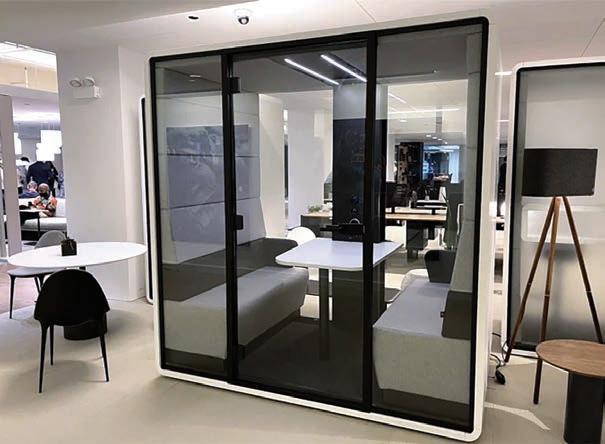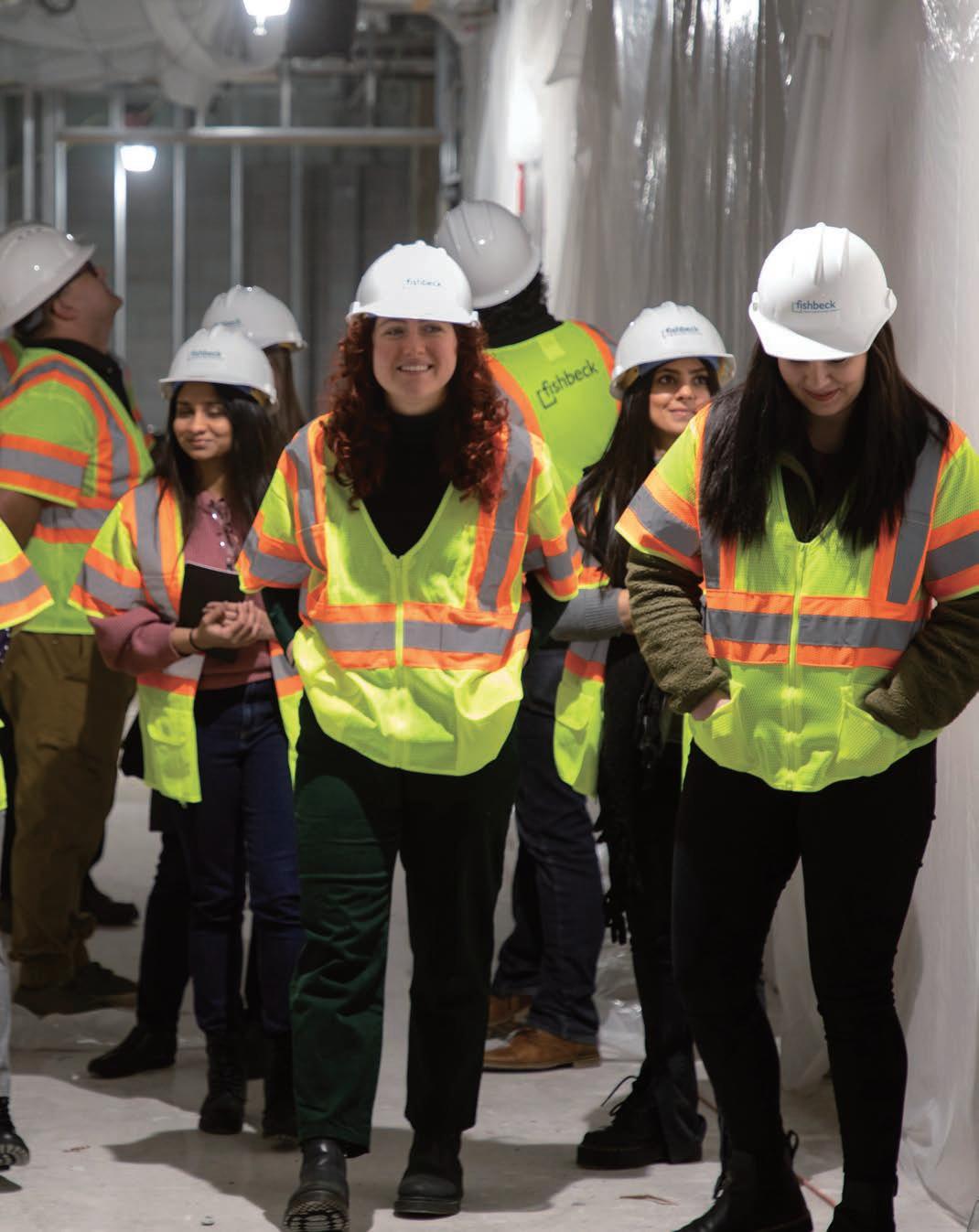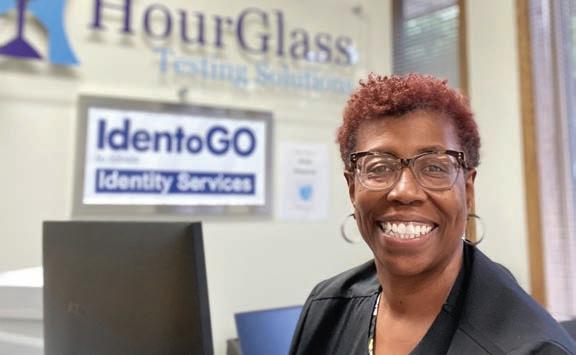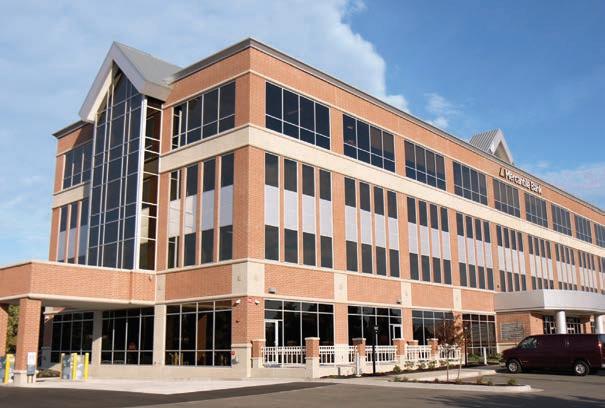Path of sweet redemption
Wealthy Street Bakery took a chance on hiring a homeless man; four years later, he owns the company |
BY ABBY POIRIER
Andy Havemeier embarked on a four-year journey to become an owner at two of Grand Rapids’ most popular bakeries just after he “went down a dark path” and hit rock bottom.

His battle with alcohol use disorder cost him a series of jobs and ultimately left him homeless. Struggling under the weight of his addiction, he turned to Guiding Light for help in 2019, joining the Grand Rapids-based nonpro t rehabilitation and recovery program’s sober living community.
After six months in the program, the nonpro t allows participants to start looking for a job. at’s when Havemeier set up what he
MSHDA taps 3 partners for housing plan
Directive is to create action plan by addressing disparities in West Michigan
By Rachel Watson
ree partners will help create a regional housing plan for West Michigan as part of Michigan’s rst Statewide Housing Partnership.
Housing Next, e Right Place Inc. and Urban League of West Michigan will serve as the lead West Michigan organizations in driving a ve-year regional strategy for housing solutions, according to a statement from the Michigan State Housing Devel-


opment Authority.
e Statewide Housing Plan, announced in May 2022, aims to increase the accessibility of housing in Michigan by addressing racial housing disparities, creating or rehabilitating 75,000 housing units that range in a ordability and housing type, reducing homelessness and increasing home energy e ciency.
Gov. Gretchen Whitmer formed a Statewide Housing Partnership by executive order to enact the plan in September. MSHDA then selected 15 regional hubs around the state to implement plans within their regions.
e West Michigan region includes 13 counties: Allegan, Barry, Ionia, Kent, Lake, Mason,
Secchia scion plans Monroe North venue

anticipated being a “practice interview” at Wealthy Street Bakery as he got ready to dive into the job search.
Little did he know at the time that the interview would ultimately lead him to be in a position to one day take over the bakeries as a part owner and operator.
On May 31, Havemeier and a group of six local co-investors closed on a deal to acquire Wealthy Street Bakery and Hall Street Bakery from longtime owners Jim and Barb McClurg, who plan to advise the new ownership through a transition period.



Former Riverfront Fitness site will feature plenty of Grand Rapids nostalgia, bocce ball
By Kate Carlson
Mark Secchia recently moved back to his hometown of Grand Rapids, bringing with him plans for a bocce ball-focused entertainment venue with a bar and restaurant serving a healthy portion of Grand Rapids nostalgia. e 50-year-old son of the late-businessman Peter Secchia purchased the former Riverfront Fitness Center located at 975 Ottawa Ave. NW for $2.5 million at the end of March. He plans to fully renovate the 50,000-squarefoot building into a mixed-use
entertainment center known as e Rec Room with ve bocce ball courts, a restaurant, bar, private event space and 55-space
CRAINSGRANDRAPIDS .COM I JUNE 26, 2023 VOL. 40, NO. 13 l COPYRIGHT 2023 CRAIN COMMUNICATIONS INC. ALL RIGHTS RESERVED FOOD AND DRINK Breweries, distributors battle over nonalcoholic beer in taprooms. PAGE 3 CRAIN’S FORUM Teen labor in high demand, but pitfalls lurk.
REAL ESTATE Fancy Real Estate brings ‘refresh’ to market.
23
PAGES 9-15
PAGE
Mark
entertainment
bar, restaurant
| COURTESY OF THE REC ROOM
Secchia plans to convert the former Riverfront Fitness Center at 975 Ottawa Ave. NW into a bocce ball-focused
space with a
and event space.
Andy and Ondrea Havemeier with their son Floyd inside the Hall Street Bakery location. Andy Havemeier worked with six local investors to buy Wealthy Street Bakery and Hall Street Bakery from the McClurg family. SETH THOMPSON, GREEN FROG PHOTO
See BAKERY on Page 28 See THE REC ROOM on Page 28 See HOUSING on Page 29
OVER 6 IN 10 READERS BELIEVE CRAIN’S GIVES THEM A COMPETITIVE EDGE CRAIN’S PARTNER PROMOTE AND PUBLICIZE YOUR INDUSTRY EVENT NEWS INCREASE ATTENDANCE AT YOUR WORK EVENTS Networking & Educational Events / Seminars & Conferences Fundraisers & Galas / Events of Interest to the Business Community SUBMIT AN EVENT Debora Stein / dstein@crain.com
Breweries, distributors battle over nonalcoholic beer in taprooms
State and federal definitions differ, creating confusion
The quest by many Michigan-based breweries to sell nonalcoholic beer in their taprooms has run headlong into a quagmire of dueling interpretations of state regulations, opposition from the powerful wholesaler lobby and economics.
Citing the high cost to make NA products that have such a small market share and little chance for a return on investment, owners of brewery taprooms would like to buy existing NA beers such as products by craft producers like Athletic Brewing Co. or macro brewers like Heineken to serve over their bars to patrons.
So far, state regulators and beer wholesalers have not allowed that to happen.
At issue is how the Michigan Liquor Control Commission defines beer. Unlike the definitions for wine and spirits that are determined by alcohol content, the MLCC’s regulatory code defines beer by its fermentation process, regardless of its alcohol by volume.
Because most NA beer is brewed like any other beer before it is dealcoholized with expensive equipment, state regulators view it through the same lens they would an imperial IPA, for example. Under the Michigan Liquor Control Code, licensed breweries can only serve the beer they manufacture, whether it has an ABV of 0.5% or 10%.
By comparison, the federal government defines beer as beverages with 0.5% or more ABV for the purposes of regulation and taxation by the Department of the Treasury.
To Scott Graham, executive director of the Michigan Brewers Guild, the “seemingly awkward and nonsensical problem” represents an “inconsistency” in state regulations that “shouldn’t be a big ask to rectify.”
“Non-alcoholic beer should be defined like non-alcoholic wine, and then it wouldn’t be an issue,”
Graham said. “Why is non-alcoholic beer singled out as not having an alcohol percent qualifier when alcoholic liquor in the code is and wine is?”
Graham is pushing for a bill in
By Abby Poirier
Business leaders refocus on immigration
Collaboration aims to fill talent gap, boost population
By Kate Carlson
A new collaboration between the Grand Rapids Area Chamber of Commerce, Grand Valley State University and Global Detroit will push policy makers and the business community to embrace immigration as a way to meet talent needs in West Michigan.
Business leaders discussed the multi-pronged strategy June 15 during a press conference at the JW Marriott in downtown Grand Rapids.
One component involves gathering more data to update the New American Economic Impact Report for West Michigan, which was first published in 2018 to quantify the economic contributions of the immigrant community.
help (breweries) offer responsible alcohol service.”
However, the effort to change the regulation of NA beer faces stiff opposition from the politically connected Michigan Beer and Wine Wholesalers Association, which says the reform would upend the state’s three-tier alcohol distribution system.

one in their own lane.”
Lansing to define beer by ABV rather than fermentation process, which he believes will affect only a small quantity of beer sold in taprooms and provide a “safe alternative” and a “painless way to
“We don’t view this as a necessary change to the law at all. It has the potential to be very disruptive to a system that is exceptionally competitive,” said MBWWA President Spencer Nevins. “The laws are set up to keep independence between the brewers and the distributors and the retailers, and to have every-
Nevins argues that under the existing licenses and regulations, breweries have the ability to make their own NA beers. It’s up to individual business owners to decide for themselves whether they want to make those products, he said, noting the wholesalers have opposed other attempts to go beyond what they see as the spirit of the law that allowed alcoholic manufacturers to open taprooms.
“We’ve seen through these tasting rooms a concerted effort by some craft breweries, and in some instances wineries, where they’ve really tried to make their tasting room be a Class C restaurant, which they’re not and they’re not licensed to be,” Nevins said.
The strategy also will start new programs focused on talent retention in the New American and immigrant communities and to support New Americans and immigrants looking to launch their companies.
The Grand Rapids Chamber also is relaunching its statewide Michigan Immigration Compact, which advocates for immigration policy change on the state and federal level.
“The Grand Rapids Chamber urges our congressional leaders to fix our broken immigration system to support our growing economy,” Rick Baker, president and CEO of the Grand Rapids Chamber, said during Thursday’s event. “There is no excuse for delay. While we wait for federal action, we look to drive our strategies forward.”
The supply of available talent
David Frey, philanthropist and ‘city builder,’ dies at 81
His goal: Make Grand Rapids the ‘best mid-sized city’
By Andy Balaskovitz
David Frey, the former banking executive who played an instrumental role in Grand Rapids’ downtown growth over the past 30 years, has died. He was 81. News of Frey’s death circulated Thursday night at the Economic Club of Grand Rapids’ annual dinner, according to several members in attendance. An obituary

through Metcalf & Jonkhoff Funeral Service indicates Frey “passed peacefully” on Wednesday.
“David Frey was a city builder,” said Randy Thelen, president and CEO of economic development organization The Right Place Inc. “He encouraged me, (former The Right Place leader) Birgit (Klohs) and everyone at The Right Place to reach higher. We are better as a community because of David.”
Klohs noted that Frey “wanted Grand Rapids to be the best midsized city in the Upper Midwest. He put all his energy into making that happen. We owe him a debt of gratitude.”
Frey, the grandson of John E. Frey, who founded Union Bank and Trust Co. in 1918, would go on to lead the bank as president and chairman through 2004 until its merger with JP Morgan Chase. He also served in the U.S. Navy, including a tour of duty in the Vietnam War.
Frey also played a key role in local philanthropy, serving on the boards of the Grand Rapids Community Foundation, United Way of West Michigan, the Gerald R. Ford Presidential Foundation, and The Frey Foundation, which was founded by his late parents in 1974.
“David Frey was a tireless advo-
cate for our community. He believed in the strength of people who love our community,” Grand Rapids Community Foundation
President Diana Sieger said in a statement. “His voice will be missed, and he cared so deeply about the positive growth and development for everyone in our community. He will be missed, and his legacy will live on forever!”
In 1993, Frey — along with former Amway Corp. President Dick DeVos and former Old Kent Bank CEO John Canepa — co-led Grand Action, a business group that pushed some of the largest downtown developments that are credited for generating spinoff economic activity. Those projects
June 26, 2023 | CRAIn’S GRAnD RAPIDS BuSIneSS | 3
David Frey
A quirk in the state liquor control code prevents Michigan brewers from selling nonalcoholic beers made by the likes of Athletic Brewing Co. in their taprooms. ATHLETIC BREWING CO.
“Non-alcoholic beer should be defined like non-alcoholic wine, and then it wouldn’t be an issue.”
See BREWERIES on Page 29 See IMMIGRATION on Page 29 See FREY on Page 28
Scott Graham,
executive
director
of the Michigan Brewers Guild
American Seating moving to former Steelcase property
Site is close to major freeways and the airport
By Kate Carlson
American Seating Co. is securing permits to relocate its longtime manufacturing operation and offices from the West Side to the former Steelcase campus on the city’s south side.
First Companies Inc. recently filed an application with the city on behalf of American Seating to complete an industrial remodel at 1040 40th St. SE. Ghafari Associates is listed as the project architect.
The proposal calls for demolishing a small office space on the north end of the building, renovating the parking lot and remodeling the inside of the building to add a mezzanine for office and support space.
The overall plan would modify the existing facility to support American Seating’s relocation from its longtime headquarters that dates back to the late 19th century.
Property records show the nearly 39-acre property is owned by a Canadian company doing business as 1040 Michigan LP, which purchased the property for nearly $48.8 million in June 2022 from an affiliate of Livonia-based Schostak Brothers & Co. Schostak Brothers acquired the 950,000-square-foot distribution facility in 2019 for $24.1 million.
American Seating selected the site for “a number of factors,” including its location in the city of Grand Rapids and its proximity to major freeways and the airport, according to an American Seating
123Net launches new internet exchange in Grand
Rapids
spokesperson.
“It’s also a location where we believe we’ll be able to recruit even more employees,” the spokesperson said in an email.
Company officials expect to make a formal announcement with more details on the relocation plan soon.
American Seating’s move to the facility also marks a return of fur-
new construction, selling its last parcel at Grand Rapids Commerce Center in 2021.
American Seating’s new location is just north of and abuts the Steelcase Learning and Innovation Center and its 44th Street corporate headquarters.
GR-iX builds on company’s growing presence
By Kayleigh Van Wyk
land, Muskegon, Traverse City, Saginaw, Detroit and Lansing.
niture manufacturing to the site, which formerly was part of Steelcase’s legacy manufacturing campus.
As a result of restructuring and modernizing its operations, Steelcase as of 2005 vacated more than 4 million square feet of buildings spanning more than 200 acres between 36th Street and 44th Street east of Eastern Avenue at the very southern edge of the city of Grand Rapids. Steelcase in 2007 sold the campus to Ashley Capital, which marketed the site as the Grand Rapids Commerce Center.
Ashley Capital renovated some buildings on the campus and demolished others to make way for
Planning documents show an $8.6 million project cost, though company officials said details are still being worked out and declined to provide “specific numbers at this time.” The company does not plan to seek brownfield incentives at this time, according to a company spokesperson. Company officials confirmed last month that American Seating is relocating from its current location in Grand Rapids to another, previously undisclosed site in the city. The company was founded in 1886 on the west side of Grand Rapids in a headquarters and manufacturing space that has shrunk over time.
Company officials previously said their plan was to renovate a new site in phases over the next year with an anticipated completion date by early 2024. Future plans for the nearly 17-acre property at 901 Broadway Ave. NW that serves as American Seating’s current manufacturing space have not yet been disclosed.
American Seating is also moving out of 33,000 square feet of office space in the American Seating Park at 801 Broadway. Digital and IT consulting firm OST is moving into the space.
Internet and telecommunications provider 123Net Inc. has launched a new fee-free internet exchange that promises better connections and faster speeds in the Grand Rapids region.
The Southfield-based company has secured the necessary infrastructure for the Grand Rapids Internet Exchange, or GR-iX, which is based out of the company’s West Michigan office and data center in Byron Center.
The exchange, which exists as a collaboration of internet service providers (ISPs), carriers, content providers and businesses, offers free ports and membership while enabling the free exchange of traffic with a decentralized approach. Exchanges are placed in strategic locations where internet providers share and optimize their traffic with peering relationships, and participants can eliminate the need for upstream service providers.
“The exchange allows us not only to provide a free way to get some internet but also a better connection that’s faster and has less latency,” said Dan Irvin, CEO of 123Net. “As the internet traffic doubles every two or three years, this is a platform that scales with that. Because it’s free, the advantages for businesses and communities continue.”
123Net operates as an ISP with data center, network and voice services. The company has nearly 5,000 miles of fiber infrastructure throughout Michigan, servicing areas such as Grand Rapids, Hol-
In 2014, 123Net introduced a similar exchange in Detroit that has since experienced significant growth in membership and traffic, according to executives. That exchange includes participation from local businesses, universities and hospitals as well as interconnections with national players such as Google, Amazon and Microsoft.
Part of what executives say has contributed to the success of 123Net’s Detroit exchange is its fee-free model. Det-iX operates as a nonprofit, and the exchange maintains a low-cost structure by minimizing the need to route internet traffic on third-party provider systems like Comcast or AT&T.
This same model will be replicated for GR-iX, and 123Net will pursue similar nonprofit status in Grand Rapids.
“Our mission is to provide great internet for communities and businesses in Michigan, and this is the way of us fulfilling that mission,” Irvin said.
Irvin said he expects the exchange to start adding members this month.
The addition of GR-iX builds on 123Net’s growing presence in West Michigan. The company originally entered this market in 2000 and has since completed several acquisitions and expansions to its Byron Center office.


Irvin said in 2017 that growing demand led to several additional route miles in the company’s fiber network.
Staffing agency balks at information request
Department of Labor wants detailed list of clients, contracts
By Andy Balaskovitz
A Grand Rapids-area industrial staffing agency says the federal government’s allegation that it’s interfering with a child labor investigation by withholding information is “wholly without merit.”
Attorneys with Forge Industrial Staffing Inc. have responded to a lawsuit filed earlier this month in federal court, telling Crain’s Grand Rapids Business that the U.S. Department of Labor’s effort to obtain detailed information about Forge’s clients via subpoena is “intrusive and unnecessary.”
“Protecting the privacy and business interests of its valued cli-
ents is a priority for Forge, and as the (Department of Labor) concedes in its filing, Forge promptly and voluntarily produced, through our office, all information requested in the extremely broad subpoena requests, with the single exception of client information,” Forge attorneys said in an emailed statement to Crain’s Grand Rapids.
The Department of Labor filed suit earlier this month in the U.S. District Court for the Western District of Michigan, asking a federal judge to compel Forge to disclose information about its clients and associated contracts.
The suit stems from an investigation launched in late March into whether Forge violated child labor laws. The investigation started a month after a New York Times report detailed widespread child labor violations across the U.S., which included West Michi-
gan companies that had hired Forge for staffing services.
Forge Industrial Staffing has provided information sought in the subpoena, except for a “complete listing of all clients’ names and addresses of the facilities for which Forge Industrial Staffing provides labor,” as well as copies of “all client contracts” for those employers, according to the Labor Department lawsuit.
Federal officials allege the com-
pany’s refusal to disclose the information was interfering with its investigation. The agency said it is seeking the information to interview employees at Forge’s client firms.
However, Forge attorneys say the Labor Department is “well aware” that the company is “very concerned that the (department’s) use of Forge’s client information will be unnecessarily disruptive to those relationships.
While the (Department of Labor) has indicated that it needs Forge’s client information so that it may interview workers, Forge sees this request as intrusive and unnecessary since they have already provided contact information for every single worker.”
Forge attorneys also say the company has offered to facilitate worker interviews by federal officials.
“Instead of responding to that offer, the DOL filed its petition,” Forge attorneys said.
Company representatives added that Forge’s “cooperation with the (Department of Labor) is consistent with its approach to requests for information from the Michigan Department of Labor and United States Immigration and Customs Enforcement. Those agencies also served requests for information, and Forge provided all information requested.”
4 | CRAIN’S GRAND RAPIDS BUSINESS | JUNE 26, 2023
Forge Industrial Staffing Inc.’s office in Cascade Township. GOOGLE STREET VIEW
American Seating Co. plans to renovate a 950,000-square-foot former Steelcase facility at 1040 40th St. SE in Grand Rapids for its new headquarters. | COLLIERS INTERNATIONAL
Blueberry farm named in human trafficking lawsuit
Federal allegations stem from an incident that occurred in 2017
By Abby Poirier
A new federal lawsuit alleges that West Olive-based First Pick Farms LLC threatened and forced a group of migrant farmworkers to get them to work on the West Michigan blueberry farm.
The Michigan Immigrant Rights Center, Farmworker Justice and Farmworker Legal Services filed the lawsuit on behalf of two agricultural workers on June 9 in the U.S. District Court for the Western District of Michigan.
In the suit, they allege that First Pick Farms in 2017 coerced a group of migrant workers in North Carolina to come to West Michigan, gave them falsified documents and then threatened to turn them into
ing conditions, which often involved working as many as 12 hours a day, seven days a week.

Guzman Rojas also alleges that the company compelled him to drive the workers to and from their housing despite not having a U.S. driver’s license at the time.
For the duration of the 2017 season, the workers were quartered in what the filing describes as an “unfurnished, dilapidated, and overcrowded house.” Two women were allotted a bedroom to share while the remaining 30-plus workers
were spread throughout the house, sleeping on the floor, according to the lawsuit.
A representative from First Pick Farms would not comment on the case when reached by Crain’s Grand Rapids Business.
Trent Taylor, staff attorney for the national advocacy organization Farmworker Justice who is serving as co-counsel on the case, said Michigan’s migrant housing regulations, which are “minimum at best,” allot 100 square feet for each person in housing, a cot to
sleep on and one bathroom per 15 workers.
“They’re not even within the ambit or close to the ambit of the permissible housing rules,” Taylor said of First Pick Farms. “The occupancy level clearly exceeded that, and the fact that they were all required to sleep on the floor was even worse.”
Velasco Rojas said in a statement the experience was “mentally painful,” adding that “being unable to rest because we had to sleep on the floor, nearly broke me.”
“The need for enforcement from the state for lawsuits (of this na-
ture) is so important to our health as a state and nation,” Taylor said. “We can have a genuine opportunity to participate in the marketplace and at the same time maintain fair living and working conditions for workers who supply us with the food on our table.”
In the 12-count complaint, the plaintiffs are requesting a jury trial and that they be awarded damages “for past, present and future medical expenses, wage loss, physical and emotional distress, mental anguish, humiliation and embarrassment,” along with punitive damages and legal fees.
the authorities if they complained about the working conditions.
Plaintiffs Feliciano Velasco Rojas and Luis Guzman Rojas allege that Antonio Sanchez, a field supervisor for First Pick Farms, came to a farm in North Carolina where they had been working and woke them up in the middle of the night. The Rojases said in court documents they were among 30 workers in the U.S. on temporary agricultural worker visas at the location.
According to the complaint, Sanchez “gave them false identification that had their respective photographs and other false identification information, and then told them that they were being relocated to a farm in Michigan where they would use the identity documents that he provided to them.”
After providing false documentation and compelling the 30 workers to board a bus for West Michigan, Sanchez took them to a house located at 1941 Cleveland Ave. in Wyoming, where they were housed for the rest of their employment by First Pick Farms, according to the court filings.
The lawsuit alleges that Sanchez told the workers they would be charged a sum of “approximately $110 per worker” for the cost of creating the false identification documents; workers also were billed for fuel for the trip.
Moving from the North Carolina farm to First Pick was an alleged violation of the workers’ H-2A visas, which are tied to specific employers, according to the filing.
They also said in court documents that Sanchez threatened to alert immigration authorities to the workers’ falsified documents if they complained about their work-
Blue Cross Blue Shield of Michigan and Blue Care Network are nonprofit corporations and independent licensees of the Blue Cross and Blue Shield Association. Value-driven plans. More resources. Better business benefits. Attracting better talent starts with having better benefits, and we’re ready to help. bcbsm.com/employers At Blue Cross, we know you want the best for your employees. That’s why we’re ready to help with plans designed to fit any budget, and coverage you can use anywhere, thanks to one of the largest networks of doctors and hospitals in Michigan. From maternity and menopause to mental health and virtual care, we offer whole health coverage and solutions that you and your team can trust. June 26, 2023 | CRAIn’S GRAnD RAPIDS BuSIneSS | 5
“The need for enforcement from the state for lawsuits (of this nature) is so important to our health as a state and nation.”
Trent Taylor, staff attorney for
the national advocacy
organization Farmworker Justice
Office furniture firms making workplaces cool
Emphasis is on giving returning workers what they need
By Jack Grieve
As employers navigate the return to in-person work, corporate furniture designers are taking it upon themselves to make the office a place where employees actually want to spend their time.
That effort was on full display at the 54th annual NeoCon convention in Chicago June 12-14, where hundreds of office furniture manufacturers — including West Michigan industry-giants Haworth and Steelcase — gathered to show off their latest products.
For an industry that up until a few years ago could fairly be described as lacking flair, the designs at NeoCon were unapologetically flashy. Private offices and conference rooms were outfitted with motion-sensing video software. There were sound-proof rooms, compactible walls and mobile technology carts that function like portable charging stations. You’d have been hard pressed to find a desk without electronically adjustable settings.
The designs are part of a broader push by furniture makers to embrace the comforts brought on by remote work.
“If it’s easier and better for people to work at home than going into the office, then they’re not going to come in,” said Gale Moutrey, vice president of innovation and brand management at Steelcase. “How do you make the office as good or even better than what you have at home?
“We have to get beyond the conversation about how many days a week people are going to work in person,” she added. “Instead, let’s
talk about, when they are there, what are the things that you need to give them to help them do their work better?”
From a design perspective, the playbook for achieving that is threefold: integrate technology, embrace flexibility and create privacy within communal spaces. Nearly every new design from manufacturers touched on at least one of those themes, and many incorporated of all three.
Grand Rapids-based Steelcase, for instance, partnered with Logitech, Microsoft and Zoom to design products that blend furniture design with software. Its curved Ocular tables, which are designed to improve sightlines during hybrid video meetings, was named the best collection for collaboration at NeoCon.
“People expect the technology and the space to work together,” Moutrey said, explaining that collaboration with tech companies now happens at every step of the design process.
While tech integration rep-
resents an opportunity for furniture makers, hybrid work habits are challenging some traditional principles of office design. One hurdle: Employees grew accustomed to a level of privacy that’s simply unattainable in a cubicle-style work environment.
Furniture manufacturers are getting creative to replicate that privacy within the office. Hol-
video conference rooms to communal collaboration spaces. They block sound from going in and out, providing a space to privately call remote co-workers.

“We’ve put particular emphasis on a space within a space,” said Paul Nemschoff, Haworth’s vice president of global strategy. “People want their own spaces to go into to do video calls. They want to find a quiet space that they enjoy working in where they can relax and plug in.”
Steelcase and Zeeland-based MillerKnoll, which wasn’t at NeoCon but had showrooms at the nearby Fulton Market Design Days event, have rolled out phone booths of their own.
Designers are also rethinking whether the traditional cubicle model was conducive to collaboration in the first place. MillerKnoll has put particular emphasis on creating collaborative office spaces with unassigned work areas and gathering spots where employees can come together.
“With hybrid work, you don’t necessarily have to have a desk for everybody to be at all day long,” Anderson said. “It’s all about designing space that can adapt for whatever the employees need.”
Added Nemschoff: “The big thing about the workplace now is enabling flexibility. It’s about enabling the individual to work how they want to work.”
land-based Haworth, for example, has rolled out a series of modern-day phone booths intended for private work within the office. The acoustical pods on display at NeoCon range from single-person

“If people are going to come into the office and take video from their laptops, we need a different approach to workstation design,” said Ryan Anderson, MillerKnoll’s vice president of global research and insights. “We need to add a little bit more boundaries.”
Part of that means recognizing that the office is now in direct competition with home. “If it’s easier and better for people to work at home than going into the office, then they’re not going to come in,” Moutrey said. “How do you make the office as good or even better than what you have at home?”
WOOD-TV8 staff push back on Pride Month memo
Station managers claimed conservative opposition to stories
By Kayleigh Van Wyk
Leaders at Grand Rapids-based NBC affiliate WOOD-TV8 are facing pushback from staff following an internal memo that instructed reporters to scale back on Pride Month news coverage.

According to the June 13 memo sent from assistant news director Amy Fox on behalf of news director Stanton Tang, the station had received complaints from conservative viewers following Pride-related stories.
“June Pride Month is off to a busy and active start in West Michigan and around the country. We have already done a number of valuable stories about several Pride related events,” according to the memo, obtained by Crain’s
Grand Rapids Business. “But, we have also started to hear pushback from viewers who are not happy to see those Pride related stories. We know that West Michigan is a conservative area in many ways. We need to recognize that some stories related to LGBTQ issues are going to be controversial and polarizing in our community. While you personally may not agree with a certain position, people are entitled to their opinions and they are our viewers.”
The memo urged reporters to “not cover every Pride event that we learn about” and “do some work to discern the newsworthy-ness of the event.”
Citing the viewer pushback, as well as lack of time and newsroom capacity to cover all events, the news directors also called for thoughtfulness in how the news is reported.
“If we are covering pride events, we need to consider how to make the story balanced and get both
sides of the issue,” the memo reads.
A majority of the newsroom staff present at the station’s College Avenue studio walked out when the memo was released on June 13, sources said.
Several WOOD-TV8 staff members also took to social media to express their disagreement with the memo’s instruction, which one staff member called “ridiculous and hurtful.” Michele DeSelms, a lead anchor at the station, said via Twitter on June 15 that the instruction was “essentially requiring us to give equal time to hate and discrimination. We said no, and will continue to fight for our LGBTQ colleagues, family members.”
An executive producer said via Twitter that the newsroom immediately pushed back and is not following the guidance from the memo. The tweet also indicated the two news directors involved in the memo’s distribution have
been removed from discussions surrounding Pride coverage while the station’s parent company, Nexstar Media Group, conducts an investigation.
Gary Weitman, Nexstar’s chief communications officer, said in an emailed statement to Crain’s Grand Rapids Business: “Diversity, equity, and inclusion are among Nexstar’s core values. Our local TV stations are expected to cover and report the news of the day in an expansive and inclusive fashion, consistent with these values. We’re looking into the situation at WOOD-TV, as the communication regarding the station’s coverage of PRIDE month activities in the area is not consistent with Nexstar’s values, the way we cover the news, or the respect we have for our viewers. We will take appropriate action as necessary to address this situation, and apologize for offending members of the LGBTQ community and WOODTV’s viewers.”
6 | CRAIN’S GRAND RAPIDS BUSINESS | JUNE 26, 2023
WOOD-TV8’s Grand Rapids studio. ABBY POIRIER
“If it’s easier and better for people to work at home than going into the office, then they’re not going to come in.”
—Gale Moutrey, vice president of innovation and brand management at Steelcase
Steelcase’s award-winning Ocular table on display at NeoCon. | PHOTOS BY JACK GRIEVE
Haworth showcased a variety of phone booth-style rooms for calls and meetings.
Employers make few changes to health benefits, survey finds
Stable pricing reflects firms’ efforts to attract and retain workers
By Mark Sanchez



The tight labor market and worker shortage led many West Michigan employers to hold the line on health benefits for 2023.
An annual cost survey conducted by Grand Rapids-based The Employers’ Association found “not a whole lot of significant changes” this year from the recent past, said President Jason Reep.
Given the labor market, employers have generally been unwilling to alter health benefits that have been an important part of a total compensation package to attract and retain employees.
“A lot of it looks very similar to the prior year,” Reep said. “They didn’t make dramatic changes because they are worried about what that will do to their ability to attract and retain great employees. They didn’t make any drastic changes because they just didn’t want to take that chance.”
The Employers’ Association did not specifically ask why employers did or did not alter health benefits
that came mostly from smaller businesses. Nearly half have 100 or fewer employees, and 29% employ 100 to 250 people.
A growing percentage of employees are enrolled in high-deductible health plans.
A little more than half of the workers at companies participating in this year’s survey were enrolled in health policies with a $1,000 to $2,499 deductible for an employee-only plan and 21% had a $2,500 to $3,999 deductible, according to survey results.
Among family health plans, 54% have deductibles of $2,000 to $4,999 and 20% had $5,000 to $9,999 deductibles.
The results of The Employers’ Association survey contrast a statewide trend identified in another annual cost analysis.
Across Michigan, companies this year raised their employee contributions for health care insurance to the highest average rate in at least five years, according to the 2023 Employee Benefits Benchmarking Study by Troy-
based benefits consulting firm Marsh McLennan Agency.


The rise in employee contributions stems from companies seeking relief from overall and health care inflation after three years of pausing increased contributions during the pandemic as an attraction and retainment tool.
“Companies are asking employees to contribute more out of their pocket across the board,” said Drew Higgerson, vice president of health and benefits at Marsh McLennan. “Employee contributions from 2022 to 2023 increased five to ten percent. What we saw in 2020

was that employees’ worlds were rocked in every shape and form, so companies maintained the status quo by holding contributions relatively flat. Now, in 2023, with overall inflation and health care inflation rising for the past few years, something had to give.”
The biggest increases came in family insurance plans.
Employee contributions for HMO plans rose to an average of $429 per month, an increase of 10.3% over 2022, according to the study. That’s the largest percent rise since 2015. Dustin Walsh of Crain’s Detroit Business contributed to this story.


this year, although in HR roundtables and in consulting projects many said “with regard to the health care part of this, we’ve done about as much as we can right now under the circumstances and all things considered with the economy and the labor market,” Reep said.
That puts employers in a tight bind in balancing ever-rising costs for health coverage with employee attraction and retention.
For years, companies have shifted more of the cost of health coverage to employees as premiums steadily rose. As labor markets tightened in the last few years, employers have been hitting a limit on how much more of the rising costs they can shift.
“They are doing what they can to ensure that they find and that they attract the best employees and that they can also practice whatever they need to practice to keep those great employees, but they’re kind of at the limit on what they’re willing to spend to do some of that,” Reep said.
Employee contributions to the cost of their health coverage this year stayed within 2% of where they’ve been in recent years, Reep said. Employees in West Michigan typically pay about 20% of the monthly premium, he said.
The Employers’ Association annually surveys member employers to gauge trends in health care costs and benefits.
This year’s survey, conducted in the spring, drew 169 responses
June 26, 2023 | CRAIn’S GRAnD RAPIDS BuSIneSS | 7
“Companies are asking employees to contribute more out of their pocket across the board.”
TELLING YOUR STORY ONE SERVICE AT A TIME fishbeck.com | info@fishbeck.com
Drew Higgerson, vice president of health and benefits at Marsh McLennan
Renovated Heritage Hill Victorian lists for $950K
Former owner still lives next door
By Rachel Watson
Marilyn and Jason Kehr weren’t looking to become landlords when they bought their three-story Victorian home in Heritage Hill. But after a few years of living on the top two floors with their five children while leasing out the bottom, they were ready to restore the mansion to its full glory.
Jason Kehr, owner and president of Kentwood-based Valley City Electronic Recycling, and Marilyn Kehr, a partner at Grand Rapids-based branded merchandise provider Posy Amenities, are now selling their six-bedroom, threeand-a-half bath property at 233 College Ave. SE in Grand Rapids for $950,000.
The move comes after they spent more than $200,000 to convert it back to a single-family house.
Splendor to neglect and back again
Built in 1875, the 5,643-squarefoot brick dwelling incorporates many Victorian-era architectural influences, including Romanesque Revival on the bottom and Shingle Style on the top.

The Heritage Hill homes database doesn’t have much information about its history, but Marilyn Kehr was told the plaster relief family crest in the stairwell was created for the original occupants, the Brown family. As the story goes, they owned either a dry goods store or a mill in Grand Rapids in the 19th century. The home then passed to a second generation of Browns before being sold out of the family, she said.
By the late 1960s, the mansion had fallen into disrepair under the ownership of a landlord.
Activist Barbara Roelofs was one of the three original founders of the Heritage Hill Association that worked to preserve the neighborhood and get it on the National Register of Historic Places in 1971. She lived next door at 227 College Ave. SE, and due to neglect by the landlord, a tree from 233 College was about to fall on her house. She and her then husband decided to buy the home and fix it up, Kehr said.
Roelofs continued for many decades to rent it out until selling it in 2000 to Jason Nemic for $150,000. For 15 years, Nemic also leased it to tenants, intending to eventually convert it to single-family, but he never did. He then sold it to the Kehrs in 2015 for $389,500.
“We love old houses,” Marilyn Kehr said. “This house, we were hesitant to even look at it because it was a rental, but (Nemic) took such great care of it. I think it was his passion project. He kept a lot of the light fixtures and woodwork, and it looked amazing.”
Kehr said when they moved in, she was delighted to find that the home’s former owner, Roelofs, who is now 92, still lived next door at 227 College. She said it’s been a pleasure being neighbors with Ro-
elofs for the past eight years.
“Living next door to Barbara was amazing,” she said, noting that Roelofs has always been willing to fill her in on tidbits about the home over the years.
Transforming the first floor
The Kehr family lived in 3,000 square feet of space upstairs until 2018, when they decided to convert the bottom two apartments into main-floor living space.
“We have five kids and a dog, and we had two apartments with tenants downstairs, so of course, we were probably the worst upstairs neighbors,” she said, laughing.
The Kehrs hired Dave Mulder, founding principal of Grand Rapids-based design-build firm Fourbyeight LLC, to turn their theoretical vision for the first floor into a reality.
“We had an eye for what we wanted to do, but structurally, we weren’t sure, because it’s such an old house, what would be possible,” Marilyn Kehr said.
The main floor was divided into two apartments — one to the right of the front door and one to the left.
On the left side, the tenant had been using the dining room as a living room. The Kehrs kept it almost completely as it was except for repainting it. The room features a tiled fireplace, wood-grid ceiling and built-in features and windows.


The apartment on the left side used to have a small galley kitchen attached to a bedroom. The Kehrs had the builder demolish those rooms and construct a halfbath; large, modern kitchen; and mudroom. Marc Weigers, founder of Grand Rapids-based Greenwood Studio LLC, designed the latter two rooms.
Meanwhile, the right-hand-side apartment included rooms that were being used as a kitchen, living room and bedroom. It also had a bathroom next to the stairs in the entryway.
During demo of the bathroom, the builders uncovered a fireplace and two windows that had been drywalled over to comprise the exterior bathroom wall.
The remaining rooms on the right wing of the main floor are now the lower-level bedroom, a library and an attached turret-like bump-out room that was probably a “sunset room,” Kehr said. It has angled windows flanking a wall with a stained-glass window higher up.
“They would have had a piano in there, and the men I guess would smoke cigars and hang out after dinner,” Kehr said.
Upstairs
The home is a bit unusual in that the main family room is on the second level — a holdover from when the Kehrs lived upstairs. The room has an intricately molded, patterned ceiling and a window seat with leaded-glass windows.
To get to the family room, visitors proceed up the grand stairs past the family crest, which is next to a stained-glass window that seems to change colors throughout the day depending on the position of the sun, Kehr said.
mer attic space they converted to a loft with an attached bath.
Since the loft has a skylight — which they replaced due to leaks — they decided to add a cutout surrounded by guardwalls in the loft floor, so the sunshine from the skylight streams down onto the second floor hall.
“A lot of times, Victorian homes seem really dark and heavy, and this just really lightens things up,” Kehr said.
Dreaming of the next owners
Heritage Hill is a preservation district that has rules about what homeowners in the neighborhood can do to the exterior of their homes.
Kehr said she’s proud that their remodel of 233 College kept the historic feeling of the inside of the home without making it feel like a museum to the past.
“I think you can keep some of that, but you can also make it work for your family or your living situation,” she said.
much as we did.”
Prospects
Mike VanderWoude, a Realtor with Edison Brokers & Co. in Grand Rapids, is the listing agent for this home.
He said for a house at this price, he doesn’t expect to do very many showings. But he believes it will nonetheless draw serious buyers.
VanderWoude has sold many homes in Heritage Hill over the years. To establish the listing price for this home, he looked at four comparable sales in the neighborhood in the past couple years: 703 Madison Ave. SE, which sold for $1 million in January; 111 Lafayette Ave. NE, which went for $900,000 last July; 546 Wealthy St. SE, which sold for $900,000 in January 2022; and 339 College Ave. SE, which closed at $859,900 in November 2021.
All four were of a similar size, condition and grandeur, he said.
They took down the wall to create what they refer to as a “warming room” in the hall, bringing up matching tile from the basement to restore the fireplace surround. On either side of the fireplace, the Kehrs added two facing benches that seem like built-ins where guests can remove their shoes and rest.
The builders turned what used to be the Kehrs’ second-floor kitchen into a laundry room with an attached bath.
The master bed is also on this level, with a fireplace and an ensuite bathroom. The second floor also features two more bedrooms.
A staircase leads to the third floor, which has two more bedrooms, a storage room, and a for-
With their older children growing up and ready to leave the nest, the Kehrs are ready to downsize and move to the city’s northeast side. But she said she hopes whoever buys the home will enjoy it as much as they did while raising their kids there.
“I’m excited for someone else to have it, because I think for someone to buy a house like this, they’d have to love the area and for sure love old houses,” she said. “I just hope that the next people love it as
“They made us very comfortable that our price should be in the nines,” he said.
VanderWoude added that the Logie mansion that recently hit the market and is pending — a stone chateau that was the estate of the late John Logie, former mayor of Grand Rapids and a co-founder of the Heritage Hill Association — feels like a museum. But the work the Kehrs did on 233 College turned it into a home.
“It’s more livable than some of the Heritage Hill homes,” he said. “It’s a pretty special place.”
8 | CRAIN’S GRAND RAPIDS BUSINESS | JUNE 26, 2023
This home at 233 College Ave. SE in Heritage Hill is for sale for $950,000 after its current owners converted it from apartments back to a single-family home. | NEXT DOOR PHOTOS
“I’m excited for someone else to have it, because I think for someone to buy a house like this, they’d have to love the area and for sure love old houses.”
—Marilyn Kehr, homeowner
TEEN LABOR IN HIGH DEMAND, BUT PITFALLS LURK
Earlier this year when an investigation by the New York Times revealed children, some younger than 15, were working illegally in overnight shifts at food processing giant Hearthside Food Solutions in Grand Rapids, the state of Michigan was unaware.

Most of these children were undocumented immigrants, but even if they were native-born school kids in nearby Kentwood Public Schools, the state would have been unaware. Even if Hearthside’s labor contractor pulled the appropriate work permits to employ those children, the state would have been unaware.
e state of Michigan, like many states in the U.S., has no infrastructure in place to track minor children who are working nor where they work nor whether they are working to the labor standards
required by the state.
“Michigan and most states have a bifurcated system,” said Sean Egan, the deputy director of labor for the Michigan Department of Labor and Economic Opportunity. “Minors have to have a work
OPINION: Employers who hire teen workers have both an opportunity and a responsibility. PAGE 13
OPINION: Unaccompanied immigrant children are at risk of exploitation, but we can do more to keep them safe. PAGE 14
permit and that’s handled by the Michigan Department of Education. e school district where the minor lives has to sign the work permit, but those don’t go anywhere. ey aren’t sent to the education department or us. We simply don’t know where young
DUSTIN WALSH, CRAIN’S DETROIT BUSINESS


people are employed until there is a complaint. We have the authority to investigate but we don’t have the sta to show up everywhere.
So unless someone les a complaint … .” Michigan enforces its labor standards. Some states, like many in the South, rely solely on the understa ed U.S. Department of Labor to enforce labor rules concerning minors.
e awed system for regulating minor labor is now under a microscope after the NYT report. e labor department earlier this year reported a 69% increase in children employed illegally by companies since 2018. Last year alone, the department found 835 companies in the U.S. employed 3,800 children in violation of labor laws.

JUNE 26, 2023 | CRAIN’S GRAND RAPIDS BUSINESS | 9
TEEN LABOR AND SAFETY
A tight job market has put a spotlight on child labor laws and exploitation; Michigan needs to improve tracking when and where they work |
BY
Sean Egan with the Department of Labor and Economic Opportunity says Michigan should keep track of where teens are working. DALE G. YOUNG
“The overall broad trend is that employers are desperate for workers who will accept bad wages and crappy conditions.”
Daniel Costa, director of immigration law and policy research, Economic Policy Institute
See LABOR on Page 10
BRIAN STAUFFER
CRAIN’S
Yet many states have turned to minor labor to supplement labor shortages. As of June 1, 14 states, including Iowa, Arkansas and, yes, Michigan, have recently weakened or proposed changes to their child labor laws to appease industries struggling to fill out their workforce or under the guise of parental rights.
“The overall broad trend is that employers are desperate for workers who will accept bad wages and crappy conditions, like always,” said Daniel Costa, director of immigration law and policy research at Washington, D.C.based think tank Economic Policy Institute. “With the pandemic, a drop-off in immigration and more people out of the workforce … that’s a recipe for more youth labor. And we’re seeing states rolling back child labor laws. That’s scandalous.”
But Michigan is looking to follow the lead of New Jersey, which recently strengthened its ability to enforce regulations by shifting minor work permits to its department of labor.

“We have thousands and thousands of kids working, but we only get to monitor that from the few hundred complaints we receive (annually),” Egan said. “In New Jersey, they now know exactly where young people are working and can better enforce their youth employment standards. We know we have to do better, so we’re evaluating a change.”
Underage opportunity

The COVID-19 pandemic pushed teens into the labor market in a big way, as many companies struggled to fill roles. The U.S. labor force participation rate for those age 16 to 19 climbed to 36.6% in late 2022, up more than 380,000 in that age range from 2019.
Older workers simply weren’t interested in the low-paying jobs typical in the restaurant, hotel and retail industries while the federal government handed out stimulus funds and COVID-19 remained a threat, particularly in the second half of 2021 when those sectors picked up steam after the release of COVID-19 vaccines.



In fact, those aged 16 to 24 saw the largest 12-month average median wage increase in July 2022 than any other age group, according to data from the Federal Reserve Bank of Atlanta. It’s important to remember that minors are typically paid less than their older colleagues. In Michigan, the minimum wage for working minors is $8.59 in 2023, only 85 percent of the regular minimum wage.
But even if teens are attractive to employers, federal rules prevent them from working in many industries.
The U.S. labor department sets the floor on minor employment standards and has a list of banned
jobs and industries, such as jobs in roofing or the use of meat processing machinery. Minors younger than 14 are banned from working at all, except for their parents or in certain agricultural settings.
States are then allowed to layer more rules on top of the federal standard. Michigan’s labor standards for minors go above and beyond the federal rules.
Michigan requires 30-minute uninterrupted breaks for all minors for every five hours worked and restricts how early and how late a minor can work, both during the school year and during the summer.


Employed minors younger than 16 can’t use ladders or operate rides at amusements parks.


So to appease employer demand, and sometimes politics, many states rolled back these protections — some below the standards set by the feds.
In late May, Iowa Gov. Kim Reynolds signed an expansive labor bill that peeled away child labor protections. Iowa businesses can now hire 14-year-olds in some hazardous industries and 15-year-olds in manufacturing. Teens as young as 14 can work six-hour shifts at night during the school year and 16-year-olds can now serve alcohol.
In March, Arkansas eliminated youth work permits to verify age and parental consent for employment.
In June 2022, Michigan Gov. Gretchen Whitmer signed legislation that changed the state’s Liquor Control Commission standards to allow 17-year-olds to serve alcohol in restaurants. The previous standard was 18 or older.

“This industry is operating with 35,000 fewer workers than it was pre-pandemic and as we head into peak tourism season it needs every edge it can get just to keep its head above water,” Justin Winslow, president and CEO of the Michigan Restaurant & Lodging Association, told Crain’s after the legislation reached the governor’s desk.
Anne-Marie Welch, partner and employment attorney at law firm Clark Hill PLC, said the confluence of an administration eager to crack down on child labor violations and employers’ need for workers is increasing interest in the area of minor labor.





“These issues haven’t been on the forefront like this before,” Welch said. “We have a (Department of Labor) that have made child labor laws a priority, but on the other side of the coin we have workplaces that need workers. We’ve got workers that want to obtain experience and training, and those workers are minors. So companies are more willing to take on that responsibility.”
Avoiding exploitation
That responsibility is at the forefront for regulators and child welfare advocates, as it’s clear at


10 | CRAIN’S GRAND RAPIDS BUSINESS | JUNE 26, 2023 TEEN LABOR AND SAFETY
LABOR From Page 9 ON THE Stay Ahead of Industry News MAKE AN ANNOUNCEMENT! Debora Stein | dstein@crain.com We get you. We’ve got you. A full-service law firm, fully focused on you. We’re a law firm that gets you because we’re real people who understand your personal, business, or
For
we’ll
you
you
accessibility and
to
mikameyers.com See LABOR on Page 12
local government issues.
any need,
meet
right where
are, delivering a blend of
versatility that’s second
none.
Here are the rules for employing teens in Michigan




Michigan’s laws, regulations and rules regarding teen employment are specific and have remained mostly unchanged in recent years. Those younger than 16 face strict limits on the hours they can work, both during the school year and in the summer, while 16- to 17-year-olds who are still in high school have more flexible, but still restricted options.
Minimum wage
$8.59 in 2023, 85% of the regular minimum wage
Hours
w May not work during school hours when school is in session.
w No more than six days a week and no more than 10 hours a day; weekly hours must average eight hours a day.
w Special penalties apply for employing minors in jobs involving cash transactions after sunset or 8 p.m., whichever is earlier, without required supervision.

Restrictions: Ages 14-15
w Not before 7 a.m. or after 9 p.m.
w No more than 48 hours of combined school and work per week.
Changes
Restrictions: Ages 16-17
w Not before 6 a.m. or after 10:30 p.m. Sunday-Thursday when school is in session or after 11:30 p.m. on Friday and Saturday when school is in session.
w Limit work to 24 hours per week when school is in session. May work up to 48 hours a week when school is out.
In 2022, Michigan lowered minimum age on who can serve alcohol to 17.
Exceptions
w 16- and 17-year-olds who have completed requirements for high school graduation.
w 17-year-olds who have passed the GED test.
w Emancipated minors.
w 14 years and older working under a work-study contract between an employer and a school district that provides supervision.




w Domestic workers at private homes.
w Minors working in businesses owned and operated by their parents.
w Workers who plant, cultivate or harvest crops or raise livestock on farms.
SOURCE: MICHIGAN DEPARTMENT OF LABOR & ECONOMIC OPPORTUNITY
June 26, 2023 | CRAIn’S GRAnD RAPIDS BuSIneSS | 11
TEEN LABOR AND SAFETY
PHOTOS BY GETTY IMAGES
From Page 10
least some companies use child labor improperly.
In February, a federal investigation found more than 100 children between 13 and 17 were working in hazardous occupations at 13 meatpacking operations owned by some of the country’s largest processors, including Tyson, JBS and Cargill. Auto parts plants in Alabama that supplied Hyundai-Kia were discovered to have been employing children as young as 14, some of them Guatemalan immigrants, in low-wage jobs.

A balance between a teen workforce that earns money and learns responsibility, and that can avoid exploitation may be tricky.


According to a 2018 study the Industrial Psychiatry Journal and promoted by the U.S. National Institutes of Health, low-income families and their children are most harmed by child labor. Employed children are more likely to drop out of school and suffer physical, intellectual and mental health disorders.
Globally, 73 million of the 152 million children employed work in hazardous conditions, according to a report by the United Nations’ International Labour Organization. In fact, children aged 5 to 11 account for 48 percent of the minor labor force, mostly in agriculture and heavy industry.
In agriculture, child labor laws tend to be much more lax, even in Michigan.
Children can be working in the agriculture sector in the state at 13 as long as it’s not during regular school hours during the school year. Children 16 and older can work during school hours. And the state does not restrict any function of agriculture as hazardous for children older than 15, so a child can work with harmful fertilizers if tasked to do so.
Despite the industry accounting for only 1 percent of the U.S. workforce, 48 percent of all fatalities of working minors occur in agriculture, according to data from the U.S. Bureau of Labor Statistics on work fatalities.

Costa, with the Economic Policy Institute, said labor violations involving minors are likely far more common than known due to poor reporting mechanisms and understaffing in regulatory bodies.
“There were about 80 investigations per month last year; that’s less than 1 percent of ag businesses being investigated in a year,” Costa said. “They can pretty much do whatever they want without worrying if they are going to be investigated. The complaints are worker driven and there’s plenty of incentive not to complain, especially if you’re an immigrant or poor.”

And even if a company is inves-



tigated, the fines are low enough to not be overly bothersome, Costa said.
In Michigan, the labor department can levy a maximum fine of $15,000 for violating labor regulations involving a minor.

“It’s just the cost of doing business,” Costa said. “If they get busted, they’ll probably have to pay back wages they should have paid to begin with and maybe pay a fine. No one is going to jail. And that’s only in the rare instance they get caught.”
Cascade Township-based Forge Industrial Staffing, the staffing firm that the New York Times investigation names as placing underage workers at Hearthside, was sued earlier this month by the U.S. Department of Labor, which alleges the staffing firm has not complied with subpoenas related to the investigation. The labor department alleges the company has yet to produce client contracts and client names for companies where it supplies workers.
Michigan’s teen workers
Jennifer Fields, director of the wage and hour division of the Michigan labor department, which leads minor labor investigations, said the biggest current deterrents to exploitation are the state’s workers’ compensation rules. If an illegally employed minor gets injured on the job, the employer is obligated to pay double the worker’s compensation under regulations.
But the state would have to
know about that minor’s employment — something it currently does not know unless a complaint is filed. While the state fields only a few hundred complaints annually, that number is rising. Complaints in 2022 were up more than 31% to 283 complaints over 216 in 2020, according to state data provided to Crain’s.

There is no current timeline for when, or if, the state may adopt a new requirement that work permits will be distributed by the labor department instead of school districts.
“If we have kids working, especially those working to support their families, we can’t let that take away from what they could become,” Egan said. “I don’t know where the next Einstein is, but I want to make sure they had the ladder to get there. A minor’s health, safety and education needs to be thought of first. We need to make sure that’s protected, so that they at least have the chance to become the next Einstein.”
12 | CRAIN’S GRAND RAPIDS BUSINESS | JUNE 26, 2023
a unique opportunity to
your
SHARE YOUR SUCCESS with custom reprints, logo licenses, awards and more. AN EXTRAORDINARY
EXPERIENCE. 1000
Contact Laura Picariello at lpicariello@crain.com for
co-brand
company with a reputable news source.
EVENT
E. Beltline Avenue, NE, Grand Rapids, MI 49525
616-975-3146
| FacilityRental@MeijerGardens.org
MeijerGardens.org
| @MeijerGardens
Our professional Event Coordinators can help make your special event a dream come true.
TEEN LABOR AND SAFETY LABOR
Heather Kan
“They can pretty much do whatever they want without worrying if they are going to be investigated.”
Daniel Costa, director of immigration law and policy research, Economic Policy Institute
Teen workers deserve to have safe workplaces
June is Youth Employment Month in Michigan, a time to celebrate our youngest and newest members of the workforce and to make sure they have opportunities that help them build a brighter future by combining academic success and healthy workplaces.
Working at a paying job helps our youth build a strong work ethic, learn time management skills, accomplish tasks, follow directions and more. It’s their first introduction to the working world, and it’s important that our youth have these opportunities — as long as they’re done with the proper protections in place.
Many of us recall seeing historical images of children working in hazardous occupations prior to the passage of the Federal Fair Labor Standards Act in 1938. Starting at extremely young ages, children working was an important piece of the overall family economic unit. With low wages and poverty, every hand in the household needed to chip in to maintain food and shelter. However, this type of employment also had a detrimental impact on the health, development, longevity and overall contribution of children to our society, so our nation made a policy decision that ended children working before the age of 14 and established guardrails for those between age 14 and 17 while still in school.
Today, these guardrails are in place to protect youth from hazardous conditions, ensure they are fully participating in school and maintain their hours of work are balanced with adequate rest periods. The safety and well-being of our youth is always the predominant factor with youth employment laws and policies.
The primary goal is to ensure that children can reach their full potential educationally and developmentally while also allowing meaningful employment opportunities.
Michigan adopted Youth Employment Standards that prescribe more stringent requirements on working hours, occupations and a few other pieces that are not covered under federal law. This gives employers more clarity by eliminating vague obligations, so that schools, parents and students recognize that work is an educational opportunity that must not interfere with the in-school (or virtual) education of the student.
Educating parents, employers, schools and minors about legal employment is a top priority of the Michigan Department of Labor and Economic Opportunity’s Wage and Hour Division. We often do webinars and events and are happy to help upon request to ensure everyone understands their rights and obligations under these important standards. We also do outreach collaboratively with the U.S. Department of Labor to help
employers understand they must follow the stricter of the two standards.
For some Michigan specifics:
w Employers are required to obtain work permits before a minor starts employment. Youth workers obtain a work permit from the school district in which they reside, whether they are a student there or not (e.g., home-schooled children). The school district issuing officer must sign the complete
work permit and ensure that the type of employment, hours to be worked and the work itself does not interfere with educational requirements.
w Youth workers are entitled to a 30-minute break following five hours of work.
w Youth workers must be under the supervision of an adult at all times while working.
w Youth workers must work within the prescribed hours or are limit-

ed to the prescribed hours between school and work.
w Youth workers cannot work in “hazardous” occupations, which are defined in the statute or the rules.
We encourage everyone to join our efforts as we highlight opportunities and obligations for youth employment in Michigan. Visit michigan.gov/wagehour to learn more and sign up for future youth employment webinars.
WEST MICHIGAN’S COMMERCIAL REAL ESTATE TEAM







June 26, 2023 | CRAIn’S GRAnD RAPIDS BuSIneSS | 13 INDUSTRIAL OFFICE RETAIL INVESTMENT MULTIFAMILY PROPERTY MANAGEMENT
When you partner with NAI Wisinski of West Michigan for solutions to your brokerage or property management needs, you gain access to a global network with the best tools and techniques in the industry. We combine this global reach with local expertise as we remain independently owned, providing our clients with a wealth of West Michigan market knowledge and experience.
Grand Rapids | Kalamazoo 616 776 0100 naiwwm.com TEEN LABOR AND SAFETY
COMMENTARY
Jennifer Fields is the wage and hour division manager for Michigan’s Department of Labor and Economic Opportunity/ Bureau of Employment Relations.
Immigrant workers need our protection
Recently Michiganders were alarmed to learn that unaccompanied immigrant children are working in dangerous conditions. Sadly, this suffering is both predictable and preventable.
As a nonprofit immigration legal services provider serving unaccompanied immigrant children in Michigan, we have long expressed concerns about the rights and safety of immigrant workers. Helping children caught between our nation’s crushing immigration and labor systems requires an understanding of the context of immigrant children’s lives and commitment from policymakers to do better.



First, our immigration system is effectively designed to keep part of our population without legal status and vulnerable to exploitation. As broken institutions, gang violence, natural disasters and repression push many in Latin America to seek safety abroad, there are virtually no legal options for people to secure protection or the chance to work in the U.S.
Even those with a path toward asylum or other lawful status endure years without work authorization or access to assistance, and struggle to secure food and housing.
Federal lawmakers could address immigration-related issues that make immigrant workers vulnerable. Initiatives to expand refugee admissions for the Western Hemisphere and fresh efforts to offer protections to exploited workers could be transformative.


But other new steps, such as the asylum ban, will increase the risk of family separation and children making dangerous journeys alone. Comprehensive reforms to our immigration system are needed to build an equitable and fair system that supports families and communities. We need efficient procedures so that workers aren’t sidelined waiting for permits and children can more quickly secure permanent status.
Critically, we must ensure the safety of all workers. Many worksites are unsafe for both children and adults. To better serve immigrant workers, state and federal labor standards enforcement agencies need full funding to achieve robust language access and bilingual staffing. To protect workers who come forward, they must enforce prohibitions on retaliation.
We meet many workers who are not properly issued pay stubs, leaving them unable to track wages and pay violations. Standardizing these practices through agency enforcement would level the playing field and prevent abuses. Even when workers are ready to report violations, agency deadlines are unduly short — making it difficult to complain after leaving a workplace and

enhancing fears of retaliation.

In both state and federal systems, increasing employer fines for labor violations would augment accountability.



Some states are considering rolling back child labor standards. Instead, policymakers should support existing workers and close loopholes allowing abuse. The Fair Labor Standards Act permits children 12 and up to work in agriculture in dangerous conditions. We can address this by passing the Children’s Act for Responsible Employment and Farm Safety. And we can correct long-standing exclusions of farmworkers from protections like rights to overtime and organizing.
It’s tempting to believe the problem of unaccompanied child labor is caused by individual bad actors. Some focus on sponsor families. In truth, the majority of families hosting unaccompanied children are motivated by a sense of duty. In speaking with hundreds of children, we learned that a sponsor’s home is where most children yearn to be. Even the best-meaning hosts confront poverty. Their desperation is exacerbated by lack of access to benefits. That distress drives youth to dangerous jobs to keep food on the table.
Policymakers can strengthen our social safety net to make these families less vulnerable. Sponsor families should receive resources to support unaccompanied children. Rather than wait for Congress to change eligibility for Medicaid or food assistance, increasingly states are expanding access to programs. Michigan currently makes it difficult for immigrants injured on the job to seek workers’ compensation.
The bottom line is that immigrant children are unlikely to work in harsh conditions if the adults in their households have a fair chance to meet basic needs.
There are solutions to protect immigrant children and adults. We must create a social safety net with room for immigrant families, provide sufficient resources for labor enforcement, and build accountability through consequences for employers who take advantage of the most vulnerable.
14 | CRAIN’S GRAND RAPIDS BUSINESS | JUNE 26, 2023 Showcase Industry Leaders Careers MAKE AN ANNOUNCEMENT! Securities and advisory services are offered through LPL Financial (LPL), a registered investment advisor and broker-dealer (member FINRA/SIPC). Insurance products are offered through LPL or its licensed affiliates. Lake Michigan Credit Union and MaxWealth Management are not registered as a broker-dealer or investment advisor. Registered representatives of LPL offer products and services using MaxWealth Management, and may also be employees of Lake Michigan Credit Union. These products and services are being offered through LPL or its affiliates, which are separate entities from, and not affiliates of, Lake Michigan Credit Union or MaxWealth Management. Securities and insurance offered through LPL or its affiliates are: May Lose Value. Not Insured by the NCUA or Any Other Government Agency. Not Lake Michigan Credit Union Guaranteed. Not Lake Michigan Credit Union Deposits or Obligations. Are you ready for retirement? A plan for your future starts today. It’s never too early to set up a meeting with one of our LPL financial advisors. Call or email to learn more and receive a free consultation. LMCU.MaxWealth@LPL.com (855) 919-2207 THE TRANSFORMATION BEGINS HERE COLLEGE OF BUSINESS PROFESSIONAL MBA www.gvsu.edu/seidmangrad • Earn your MBA in 22 months while working • Engage with a hands-on capstone consulting project • Tap into valuable community and business connections • Hybrid and remote learning options • Personalized leadership development • Exceptional faculty TEEN LABOR AND SAFETY COMMENTARY
Elinor Jordan (left) is the training and impact supervising attorney at Michigan Immigrant Rights Center. Christine Sauvé leads community engagement, communications and policy for the center.
COMMENTARY


Immigration reform would help curb labor exploitation
Iwas walking out of my very first town hall as West Michigan’s new congresswoman when the story broke. I had over a dozen text messages alerting me to the crisis — a damning exposé on migrant children working in exploitative jobs across the country. The dateline? Grand Rapids, MI.
As I read horrific stories about children in my district — some as young as my own sons — I knew I had to act immediately, and I did, with the ownership of a legislator and the urgency of a mom.
The first thing I did was call the White House.
As shocking as the revelations were, after two decades working on immigration issues, I knew how a problem like this could occur, where the fault lines in protection and enforcement existed, and how we needed to respond. I spent all weekend advocating for the creation of a task force that could fill the gaps between agencies responsible for protecting children. That same week, the Department of Labor and the Department of Health and Human Services announced the task force’s implementation with a shared hope that children will no longer fall through the cracks.
I joined forces with Rep. Dan Kildee from Michigan’s 8th Congressional District to lead efforts to advocate for resources for the agencies charged with enforcing labor standards, and we continue to work to make it impossible for child labor violations to simply be a cost of doing business.
At the root of it all: We do not have enough workers to do the jobs needed in a dynamic and globalizing economy. Our workforce looks completely different than it did when the Fair Labor Standards Act became law in 1938, and as technology evolves, it will continue to change.
Whether they know it or not, some employers exploit people’s vulnerabilities to fill gaps in their labor force. Those individuals are often migrants fleeing persecution or dangerous neighborhoods. Some of those migrants are children, under pressure to earn a living for their families.
Innocent and desperate young migrants come from uniquely vulnerable circumstances as they enter our country and then are uniquely silenced in a system lacking appropriate reporting and enforcement mechanisms.
Our outdated labor standards, our broken immigration system and our workforce shortages layer on top of each other to create incentives for children to be exploit-
ed for their labor. In the immediate aftermath of the reporting on migrant labor exploitation, everyone wanted to point fingers. But, this is a multi-system failure, and we need a multi-pronged solution.
To address the symptoms of our workforce shortages in the short term by combating child labor violations directly, I introduced the bipartisan Justice for Exploited Children Act alongside Rep. Nancy Mace. I’m equally committed to
addressing the underlying problem: We must address workforce development needs in this country. The gaps in the U.S.’s child care system, skills and trades training, alternative pathways to higher education and, critically, the need for comprehensive immigration reform could expand our labor force in legal, ethical ways.
I’ve helped introduce a bipartisan, comprehensive immigration reform bill — the Dignity Act.
Bringing people out of the shadows and into the legal workforce will also mean there are fewer shadows in which to hide and exploit children.
It’s simply unacceptable that we, as a nation, rely on other countries’ children to do our most dangerous jobs. I’m not opposed to kids working in age-appropriate jobs. I started babysitting at 12 and kids work legally on their family farms in West Michigan — but we

are talking about keeping 6-yearolds out of slaughterhouses. We must come together to root out exploitive child labor — and get ahead of tomorrow’s problems as well. Our nation’s history demands that we are constantly reforming closer to justice. As a mom, my heart is in this fight; as a legislator, it’s my responsibility to act: I won’t rest until the children in Michigan are safe, and we have a brighter future for all.
When you need a financial partner in West Michigan


















Mercantile Bank has tools and solutions to help businesses achieve their financial goals. From commercial, governmental and business banking,



















level - Merc is here.

June 26, 2023 | CRAIn’S GRAnD RAPIDS BuSIneSS | 15
to treasury and HCM tools, our local team o ers unparrelled service. Empowering
and communities to help them reach the
mercbank.com/business
businesses
next
TEEN LABOR AND SAFETY
U.S. Rep. Hillary Scholten, D-Grand Rapids, represents Michigan’s 3rd District.
CRAIN’S LIST TOP AREA ENTREPRENEURIAL RESOURCES
Listed alphabetically
BBB Serving Western Michigan 3330 Claystone St. SE, Grand Rapids 49546 p (616) 774-8236
westernmichigan.bbb.org
City of Grand Rapids Planning Commission
300 Monroe Ave. NW, Grand Rapids 49503 p (616) 456-3000
grcity.us
Downtown Market Grand Rapids - Incubator Kitchen 435 Ionia Ave. SW, Grand Rapids 49503 p (616) 805-5308
downtownmarketgr.com
ELEVATE
250 Monroe Ave. NW, Grand Rapids 49503 p (616) 771-0300
grandrapids.org/business-services/elevate
Entrepreneurs Organization West Michigan eograndrapids.org
Family Owned Business Institute
50 Front Ave. SW, SCB 3120, Grand Rapids 49504 p (616) 331-7200
gvsu.edu/fobi
Grand Angels
40 Pearl St. NW, Suite 336, Grand Rapids 49503 p (616) 566-1770
grandangels.org
Grand Rapids Area Black Businesses
P.O. Box 7717, Grand Rapids 49510 grabblocal.com
Grand Rapids Chamber of Commerce
250 Monroe Ave. NW, Suite 150, Grand Rapids 49503 p (616) 771-0300 grandrapids.org
Grand Rapids Opportunities for Women
25 Sheldon Blvd. SE, Suite 210, Grand Rapids 49503 p (616) 458-3404 growbusiness.org
Grand Valley Metropolitan Council
678 Front Ave. NW, Suite 200, Grand Rapids 49504 p (616) 776-7613
gvmc.org
Jandernoa Entrepreneurial Mentoring
171 Monroe Ave. NW, Suite 410, Grand Rapids 49503 p (616) 325-2112 jandernoamentoring.org
Ka-Zoo Angels kazooangels.org
LINC UP
1167 Madison Ave. SE, Grand Rapids 49507 p (616) 451-9140
lincrev.org
Lakeshore Advantage
201 W. Washington St., Loft 410, Zeeland 49464 p (616) 772-5226
lakeshoreadvantage.com
Local First of West Michigan
111 Division Ave. S, Grand Rapids 49503 p (616) 808-3788
localfirst.com
Michigan Small Business Development Center
50 Front Ave. SW, Suite 1020, Grand Rapids 49504 p (616) 331-7480 sbdcmichigan.org
Michigan Women Forward
535 Cascade West Pkwy. SE, Grand Rapids 49546 p (616) 765-4230 miwf.org
Partners Worldwide
6139 Tahoe Drive SE, Grand Rapids 49546 p (616) 818-4900 partnersworldwide.org
Richard M. and Helen DeVos Center for Entrepreneurship and Innovation
50 Front Ave. SW, Suite 1127, Grand Rapids 49504 p (616) 331-7528 gvsu.edu/cei
Resource description
Strengthens trust between companies and consumers through business accreditation, charity review, community programing and small business resources
Information on doing business in Grand Rapids, information on tax abatement, business expansion, downtown development and small business assistance
Commercially licensed kitchen space with professional-grade equipment for food production, packaging, prepping and catering helps food entrepreneurs and startups get off the ground by teaching new business owners about the business of food and aiding with their development, growth and collaboration.
ELEVATE aims to increase capacity for minority-owned businesses by removing obstacles through entrepreneurial mentorship and business education, creating a solid foundation for success.
EO offers numerous resources to help entrepreneurs excel in their business, family, community and personal life.
Web resource designed to serve the needs of family businesses, as well as researchers and service providers. The site offers a wide array of resources to conduct all your research from one online source. This massive source of information has been acquired from numerous resources.
Offers mentoring, strategic advice, expanding networks and connections to customers, management and venture capital. Typically invests $250K-$1M in early-stage companies.
Grand Rapids Area Black Businesses is an institution that provides a platform that propels Black entrepreneurship forward to create wealth for our community through economic and business development.
A business membership organization that provides business development programs for members, enhances the business climate in the area and advocates for public policy that supports economic growth and vitality.
A nonprofit organization that provides self-employment training, self-esteem building, mentor relationships, access to financing, including via a $1,000 to $5,000 microloan program and support networks to empower women to achieve self-sufficiency.
Brings together public and private sectors to plan and coordinate services and investments to benefit the growth and development of the region.
Mentorship program that pairs an experienced president/CEO with an entrepreneur to help guide growth and profitability.
Angel network making financial and intellectual capital available for early-stage and growing entrepreneurial companies in West Michigan, primarily the Kalamazoo region.
Helps grassroots nonprofit community development groups create affordable housing in their neighborhood for the purpose of stimulating community revitalization.
Lakeshore Advantage works hand-in-hand with businesses as they launch, expand or move to Holland or Zeeland. Provide connections and support for business expansion, tax abatement, streamlining permitting process, international business support and foreign trade zone, to name a few.
Encourages the development of a vibrant, sustainable West Michigan economy by promoting local business ownership, social equity and environmental stewardship through education, support and collaboration
Basic business training, market research, foundation skills for business startups, writing a business plan, marketing strategies, capital access and mentor program; advanced training in financial management, human resources, marketing and strategic planning; referral program to resources for a growing business
Through its entrepreneurial education and training programs, Michigan Women's Microloan Fund and Detroit Microloan Fund Collaborative, and events such as the Entrepreneur You and Dolphin Tank program, MWF works to develop a scalable model that provides access to capital and a strong entrepreneurial ecosystem for women.
Nonprofit Christian organization reducing poverty through job creation initiatives. Offers business mentoring partnerships, basic business practice training and improved capital access throughout the world.
Develops best practices in entrepreneurship education and community engagement that enhance and impact the creation of new ventures and opportunities.
16 | CRAIN’S GRAND RAPIDS BUSINESS | JUNE 26, 2023
STORE: Download this list now at crainsgrandrapids.com in Excel or PDF format. | The Book of Lists and other lists are also available.
LIST
SCORE
250 Monroe Ave. NW, Suite 150, Grand Rapids 49503 p (616) 771-0305

grandrapids.score.org
SpringGR
818 Butterworth St. SW, Suite 6, Grand Rapids 49504 p (616) 826-8665 springgr.com
Start Garden
40 Pearl St. NW, Grand Rapids 49503 startgarden.com
The Employers' Association
5570 Executive Pkwy. SE, Grand Rapids 49512 p (616) 698-1167 teagr.org
The Right Place Inc.

125 Ottawa Ave. NW, Suite 450, Grand Rapids 49503 p (616) 771-0325 rightplace.org
Van Andel Global Trade Center
50 Front Ave. SW, Suite 1054, Grand Rapids 49504 p (616) 331-6811
vagtc.org
West Michigan Hispanic Chamber of Commerce
2007 Division Ave. S, Grand Rapids 49507 p (616) 452-3960 westmihcc.org
West Michigan Works!
215 Straight Ave. NW, Grand Rapids 49504 p (616) 336-4460 westmiworks.org
Resource description
SCORE, a nonprofit organization, is dedicated to helping small businesses get off the ground, grow and achieve their goals through education and mentorship.

A training, mentoring and networking program designed to help budding entrepreneurs in Grand Rapids turn their ideas into thriving businesses.
Focuses on assisting entrepreneurs going from “zero to positive cash flow,” oversees the Grand Rapids SmartZone coworking space, is working on various platforms for entrepreneurs: 5x5 Night, Seamless Accelerator, Collective Metrics, TechShop and Collective Impact
Not-for-profit association incorporated in 1939 to provide practical human resource solutions to the local business community –many having business operations throughout the world. Helps hundreds of companies maximize employee productivity and minimize employer liability while seeking operational excellence through practical human resources and management advice, training, benchmark information, networking and organization development services.
Assistance and counseling for existing and prospective Kent County entrepreneurs starting a business, tax abatements, available industrial sites, technology resources, training resources, business planning and financing
Seminars, workshops and lectures provide information regarding products, countries and trends in foreign trade
The West Michigan Hispanic Chamber of Commerce is dedicated to working with all members of the community to increase the economic advancement of Hispanic owned businesses and to assist the professional growth of Hispanics in West Michigan.
We partner with employers, educators, economic developers, and community organizations to create a qualified workforce that meets our region’s current and future talent needs and fuels our shared economic future.
Crain's Grand Rapids Business list of top entrepreneurial resources, listed alphabetically, is the most comprehensive available. The list is based on Crain's Grand Rapids Business research. To be considered for future lists, email danielle.nelson@crain.com
A

CENTURY OF SERVICE AND IMPACT

Grand Rapids Community Foundation connects people and their passions with resources to meet our region’s toughest challenges. To connect with us, visit GRFoundation.org.

June 26, 2023 | CRAIn’S GRAnD RAPIDS BuSIneSS | 17
NEW
To overcome racial, social and economic inequities, we must respond with intention and care. Our partners inspire, motivate and guide our work.
Industrial Control sells to PEbacked automation distributor
Ermatinger



The owners of Zeeland-based Industrial Control Service Inc. have sold to a private equity-backed company in a deal they say will position the company to keep up with escalating demand for automation equipment.

Brothers Mark and Karl Ermatinger announced earlier this month that they sold their stock in Industrial Control to Zelienople, Pa.-based Motion & Control Enterprises LLC.
Founded in 1975 by their parents, John and Doris Ermatinger, Industrial Control distributes specialty automation products, including robotics, motion control, machine vision, barcoding systems, controls and networking, and safety solutions.

The Ermatinger brothers, who initially took over Industrial Control from their parents in 2006, will continue to run the company under MCE’s ownership.
Mark Ermatinger said the acquisition will help Industrial Control sustain growth as demand for automation solutions continues to accelerate. Ermatinger said he has witnessed a lot of M&A in the manufacturing and automation sectors as of late, which prompted a conversation at Industrial Control to consider being part of a larger, multi-state distribution group and grow quickly with those resources.
“We hear from companies every week that want to get into automation primarily because of the shortage of labor,” Ermatinger said. “We decided to get into the
to the Ann Arbor-based Association for Advancing Automation. Companies across North America ordered $2.38 billion in robots last year, an increase of 18% over 2021, which was also the industry’s prior highwater mark.
While demand softened in the first quarter of 2023 because of inflation and a slower U.S. economy, the Association for Advancing Automation noted strong orders from companies in the North American automotive sector, which “continue to accelerate their purchases as they make the transition to manufacturing electric vehicles,” President Jeff Burnstein said in a statement.
er. Because of the stock sale format, he said Industrial Control can keep its employee and vendor contracts in place.
“Everything will stay the same as much as possible,” Ermatinger said. “That’s a big part of why we sold to MCE: to keep our identity and to continue without a lot of change for our employees and customers.”





those requirements after the sale to MCE.

Terms of the deal were not disclosed.
Advisers to Industrial Control on the deal included Grand Rapids-based law firm Verspoor Waalkes PC and Texas-based M&A firm Generational Equity LLC.

game with mergers and acquisitions to be able to grow faster.”










Demand for automation equipment pushed the industry to a new record for the number and value of robots sold in 2022, according
Ermatinger was familiar with MCE through his involvement with the Association for High Tech Distributors. He initiated a conversation with the company after speaking with the owner of another business MCE acquired.
Part of the appeal in working with MCE was that Industrial Control largely will look and operate the same, according to Ermating-
Ermatinger also said he looks forward to having opportunities to market in new areas such as Detroit given MCE’s presence on the east side of the state.
“We’re very excited about the opportunities we see going forward,” he said. “We wanted a deal that made sense for our employees, our buyers and ourselves. I think we achieved that.”
Under the ownership of the Ermatingers, who are registered members of the Sault Ste. Marie Tribe of Chippewa Indians, Industrial Control operated with a minority business certification, but the company no longer meets
A portfolio company of Chicago-based private equity firm Frontenac, MCE is a supplier of technical fluid power, automation, flow control, compressed air and lubrication products, repair and services.

In addition to Industrial Control, MCE also acquired Florida-based Power & Pumps earlier this month. Since January 2021, the company has completed 10 acquisitions, according to a statement.
In a statement, MCE Chairman and CEO Charles Hale said the two new deals “will expand our geographic reach, deepen our offering of automation solutions, and expand our presence in the fluid processing market.”
18 | CRAIN’S GRAND RAPIDS BUSINESS | JUNE 26, 2023
First Merchants bankers are 100% interested in your success.
brothers will continue to run the company
By Kayleigh Van Wyk
Industrial Control Service Inc.’s headquarters in Zeeland. COURTESY PHOTO
“We hear from companies every week that want to get into automation primarily because of the shortage of labor.”
Mark Ermatinger, co-owner Industrial Control Service Inc.
CRAIN’S LIST TOP MANAGEMENT CONSULTANTS
Crowe LLP
55 Campau Ave. NW, Suite 500 Grand Rapids p (616) 774-0774 f 752-4226 crowe.com
Plante Moran
634 Front Ave. NW, Suite 300 Grand Rapids p (616) 774-8221 f 459-3594 plantemoran.com
HR Solutions Group of West Michigan
56 E. Main Ave. Zeeland 49464 p (616) 719-5372 thehrsolutionsgroup.com
The Employers' Association
5570 Executive Pkwy. SE Grand Rapids p (616) 698-1167 f 698-6624 teagr.org
DISHER

201 W. Washington Ave.
Zeeland 49464 p (616) 748-6915 disher.com
2007 Amy Kraal 10 DND
finance and accounting outsourcing, forensic valuation services, global services, healthcare consulting, market segments, risk and accounting advisory services, strategy and operations, talent and organizational development, technology consulting and transaction advisory services
185Partner with organizational leadership teams and/or existing HR departments for HR strategy, organizational development, compensation analysis, career pathing, performance management, talent acquisition, compliance and policy guidance
1939 Jason Reep
10 $320,000
110Organization development including compensation design, employee engagement, organizational culture alignment, talent/performance management, diversity, equity and inclusion strategy, coaching/mentoring, affirmative action, handbook/HR audit, onsite employee development programs, onboarding design
2000 Jeff Disher
Brent Heeres
Keri McCarthy
Aimee VandenElzen
Joe Dyer
Barb Riekse
Ryan Snip
Ryan Noble
Vicki Zylstra
130 DND
DNDDISHER provides technical talent for products, performance, and processes in manufacturing.

Crain's Grand Rapids Business list of top area management consulting firms, ranked by 2022 number of management consulting clients, is the most comprehensive available. The list is based on responses to Crain's Grand Rapids Business surveys. Crain's Grand Rapids Business defines "West Michigan" as Allegan, Kent, Ottawa and Muskegon counties. Crain's Grand Rapids Business surveyed 35 companies; 6 responded and 5 are listed. To be considered for future lists, email danielle.nelson@crain.com. DND = Did not disclose
THOUGHT LEADER REPORT
CLEAN ENERGY & EV
SPONSORED CONTENT
SPONSORED BY MICHIGAN ECONOMIC DEVELOPMENT CORPORATION

Driving Michigan towards a net-zero future
the mass acceptance of EVs. At ONE, we are committed to addressing these challenges head-on and paving the way for a green industrial revolution that will create thousands of new jobs while decarbonizing our grid and transportation ecosystem.
CUSTOM-TAILORED SMALL BUSINESS SUPPORT.

the additional bene t of dramatically reducing the risk of batteries catching re.
Driving Local Talent and U.S.-Owned Battery Production
DEEANA AHMED, PHD, is the Chief Strategy Officer at Our Next Energy (ONE). Through ONE’s energy storage technology, Dr. Ahmed aims to help build a foundation for the widespread adoption and accessibility to alternative energy sources.

In an era where the global transition to sustainable transportation is more critical than ever, ONE, a Michiganbased energy storage manufacturer, is spearheading the drive towards a netzero future in the mobility industry.
Overcoming Barriers to Electric Vehicle (EV) Adoption: Paving the Way for a Greener Future
While the widespread adoption of EVs is crucial in our transition to a sustainable future, limits on driving range, safety and cost have hindered
CRAIN’S CONTENT STUDIO
Building a Resilient Future: Local Sourcing and Ethical Practices in EV Battery Production
At ONE, we are focused on doubling the range of EVs, making them a viable and comfortable choice for consumers as their primary mode of transportation. Our breakthrough battery architecture, Gemini, successfully drove over 750 miles in a single trip in real world conditions from the Detroit metro area to the Upper Peninsula and back. Crucially, our Gemini technology also reduces the cost of the total battery pack by limiting our exposure to costly raw materials, like nickel and graphite, and eliminating cobalt.
ONE has instead chosen to use easily accessible, low-cost raw materials like iron and manganese that can be sourced from the U.S. and free trade partners with high environmental and labor standards. Iron-based chemistries carry
ONE has always recognized the strength of any industry lies in its local talent. at’s why we established a close collaboration with the Michigan Economic Development Corporation (MEDC). Last year, the MEDC announced a $1.6 billion investment through the Michigan Strategic Fund that will support ONE’s rst Michiganbased battery manufacturing campus in Van Buren Township. e facility will create over 2,100 new jobs by 2027 and be one of the few U.S. manufacturers of both LFP and anode-free cells.
Michigan o ers an exceptional talent pool and ideal location to collaborate with customers and suppliers as we advance towards U.S.-based cell manufacturing. e decision by our company to establish a new manufacturing plant in Wayne County shows the world Michigan is the place to build the future.
June 26, 2023 | CRAIn’S GRAnD RAPIDS BuSIneSS | 19
Ranked by 2022 number of management consulting clients Company Year foundedTop executive(s) No. of employees 2022 W. Mich. revenue Number of 2022 clients Services offered
1984 Josh Cole Travis Ward 96 DND 430Consulting, technology and advisory
1924 Jason Marvin 22 $6.53M 281Cybersecurity,
1 2 3 4
CRAIN’S LIST TOP AREA WOMEN-OWNED BUSINESSES
communications, advertising, branding, content marketing, digital strategy, web development, product launch, organizational/program development, strategic planning, video/animation
software development, automated verification testing for hardware and software, custom test tools, PCB design, FPGA design, model-based development and modelbased systems engineering, and more
marketing, public relations, web design, programming, web hosting, web development, social media, media buying
is an inventory technology company that offers a complete product line that tracks and manages medical supply and capital asset inventories utilizing the UDI.
12Fund development coaching, capital campaign readiness and implementation, annual giving assessment, database conversion and support, board development, grant writing, project and program development and event consulting
communications, media relations, photography, videography, marketing communications, crisis and issues management, litigation communications, social media management, branding
strategy, marketing plan execution including fractional CMO/ CRO support, digital marketing, inbound and outbound marketing, and more
attract interim, contract, full-time and executive candidates by respecting their expertise and treating them as the professionals they are. We assist them in their transitions to interim or full-time positions that are challenging and career enhancing.
20 | CRAIN’S GRAND RAPIDS BUSINESS | JUNE 26, 2023
Owner Year Established 2022 Revenue No. of West Michigan Employees 2022 Services Offered Express Employment Professionals 1760 44th St. SW, Suite 10 Grand Rapids, 49519 Janis Petrini David Robb 1996 $18.22M 35Staffing services, professional and executive search, leadership training and HR consulting San Chez Bistro 38 W. Fulton St. Grand Rapids, 49503 Cindy LottermanSchneider 1992 $5.5M 114Three restaurants Reagan Marketing + Design LLC 912 Wealthy St. SE Grand Rapids, 49506 Mary Reagan Shapton 1991 $5.3M 34Internal/external
Array of Engineers 2350 Oak Industrial Drive NE Grand Rapids, 49505 Stacy Paul 2018 $4.5M 44Embedded
LKF Marketing 259 E. Michigan Ave., Suite 208 Kalamazoo, 49007 Heather Isch 1989 $2.75M 16Advertising,
SxanPro 3500 Kraft Ave. SE Grand Rapids, 49512 Ashlea Souffrou 2019 $1.8M 13SxanPro
Kennari Consulting 401 Hall St. SW, Suite 309 Grand Rapids, 49503 Laura Kruisenga 2007 $1.75M
Sabo Public Relations LLC 100 Grandville Ave. SW, Suite 301 Grand Rapids, 49503 Mary Ann Sabo 2003 $1.5M 11Integrated
1 Bold Step 1255 Front Ave. NW Grand Rapids, 49504 Jennifer Jurgens Adam Clarke 2018 $1.27M 12Marketing
Amore Trattoria Italiana 5080 Alpine Ave. NW Comstock Park, 49321 Jenna Arcidiacono 2010 $1.2M 35Restaurant, catering,
Management Business Solutions 2935 Buchanan Ave. SW Wyoming, 49548 Floriza Genautis Amy Marshall 2006 $1.1M 9 We
Adolescent & Family Behavioral Health Services 2566 Woodmeadow Drive SE Grand Rapids, 49546 Valencia Agnew 2012 $1M 18Mental health outpatient services The Vantage Group 6701 Old 28th St. SE Grand Rapids, 49546 Missy Jackson Darrell Crawford 1994 $750,000 3 Leadership development, executive coaching, organizational development, strategic planning Perspective 3D 2656 Railside Circle SW Byron Center, 49315 Sherry Rennick 2015 $450,000 4 3D Laser and LiDAR Scanning, aerial drone imaging, property site surveys, virtual tours, digital twin creation, virtual reality viewing, virtual tours, Google business services Pam Spring Advertising 2248 Edgewater St. NE Grand Rapids, 49525 Pamela Spring 2012 $372,763 3 Television, outdoor, digital, radio, consulting, production, media buying and creative services Clique Espresso Catering 2221 Plainfield Ave. NE, Suite 115 Grand Rapids, 49505 Susan VanPoolen Liza VanPoolen 2019 $168,000 6 Mobile coffee bar, mobile espresso bar, coffee catering, coffee-shop event space 1 2 3 4 5 6 7 8 9 10 11 12 13 14 15 16 LIST STORE: Download this list now at crainsgrandrapids.com in Excel or PDF format. | The Book of Lists and other lists are also available. Ranked by 2022 West Michigan revenue
cooking lessons
are currently focusing primarily on commercial real estate before fully launching Fancy Residential.



specialize in booking romance travel. Whether it is for a honeymoon, anniversary or just a romantic getaway.




space rental for all your needs. Weddings, receptions, graduations, parties, corporate functions and so on.
digital marketing, strategy, creative, video branding, advertising, content marketing, website design and development





including

and bridge sawing, robotic
core drilling, wire sawing and non-destructive ground penetrating radar services.
general dentistry, invisalign, laser treatment, fillings, crowns, veneers, cleanings, periodontal treatment, emergency treatment, root canals, bridges, implants, extractions

Drug testing resources-locally and nationally same day onsite drug screen collections-hair, urine, oral swabs, breath alcohol testing, fingerprinting services

Crain's Grand Rapids Business list of top area women-owned businesses, ranked by 2022 West Michigan revenue, is the most comprehensive available. The list is based on responses to Crain's Grand Rapids Business surveys. Crain's Grand Rapids Business defines "West Michigan" as Allegan, Kent, Muskegon and Ottawa counties. Crain's Grand Rapids Business surveyed 102 companies; 41 returned surveys and 35 are listed. To be considered for future lists, email danielle.nelson@crain.com. DND = did not disclose

June 26, 2023 | CRAIn’S GRAnD RAPIDS BuSIneSS | 21 St. Cecilia Music Center is grateful to the generous sponsors of OUR 2022-23 Season! PRESENTING SERIES SPONSORS Premiere Level - $10,000 and above school of music SPONSORS Symphony Level - $10,000 and above AND ALSO Platinum Level - $7,500 Gold Level - $5,000 Silver Level - $3,000 Bronze Level - $1,750 Sonata Level - $5,000 HIGHLAND GROUP Blue Lake Public Radio Crain’s Grand Rapids Business Daylily Floral Smith Haughey Rice & Roegge Warner Norcross + Judd WGVU Public Media Mathison | Mathison Architects Williams Studio Taggart and Lisa Town Crowe LLP Louis M. Dexter Memorial Foundation West Michigan Piano In-School Folk + Jazz Program Sponsor In-School Folk + Jazz Program Sponsor The 2022-23 Season is supported in part by an award from the Michigan Arts and Culture Council. Waltz Level - $2,500 - $4,999 Owner Year Established 2022 Revenue No. of West Michigan Employees 2022 Services Offered Zeal Aerial Fitness 1111 Godfrey Ave. SW Grand Rapids, 49503 Christina VanDam 2018 $150,000 2 Aerial fitness Freedom Construction 1525 108th St. SW Byron Center, 49315 Carrie Wilson 2021 $132,192 3 Construction management, general contracting, owner's representative Fancy Real Estate 446 Cesar E Chavez SW, Suite 204 Grand Rapids, 49306 Hannah Greening 2022 $102,000 4 We
Genuine Vacation Grand Rapids, 49508 Vickie LaGrone 2018 $90,000 2
Isabel Media Studios Goei Center, 818 Butterworth St. SW Grand Rapids, 49504 Isabel Lopez-Slattery 2013 $70,000 3 Personal and business photography
videography Morenas Event Venue 4470 Breton Road SE Kentwood, 49508 Britney Hoskins 2022 $50,000 6 Venue
8THIRTYFOUR Integrated Communications 1365 Plainfield Ave. NE Grand Rapids, 49505 Kim Bode 2007 DND 10Public relations,
Above & Beyond Catering & Events 1307 E. Fulton St. Grand Rapids, 49503 Kim Smith 1993 DND DNDFull-service catering to the Western Michigan area Blue Blaze Public Relations 2561 Lake Drive SE Grand Rapids, 49506 Kim Skeltis 2012 DND 1 Strategic communications planning, media relations, editorial writing, content strategy, crisis counseling, influencer relations Break Room Therapy 7988 Clyde Park Ave. SW Byron Center, 49315 Dawn Levian 2019 DND 12Mental health Brewery Vivant 925 Cherry St. SE Grand Rapids, 49506 Jason Spaulding Kris Spaulding 2010 DND 42DND Diamond Concrete Sawing 855 Godfrey Ave. SW Grand Rapids, 49503 Kara Louisell 1974 DND 11We provide concrete sawing
Divani 15 Ionia Ave. SW, Suite 130 Grand Rapids, 49503 Molly Kopen 2014 DND 13We are a
dining restaurant
EM Services, LLC 678 Front St. NW, Suite 365 Grand Rapids, 49504 Laura Hopson 1993 DND 7 We
Enviah 4765 44th St. SE Grand Rapids, 49512 Lorissa MacAllister 2010 DND 8 Healthcare strategic consulting Erb Thai 950 Wealthy St. SE, Suite A Grand Rapids, 49506 Lisa Chang 13 DND 5 Restaurant catering/table food services Fulton Family Dentistry 853 Fulton St. E Grand Rapids, 49503 Sabrina Wadood 2021 DND 12Dentistry,
Happy Cat Cafe 447 Division Ave. S Grand Rapids, 49503 Kati Quarto DND DND DNDDND HourGlass Testing Solutions 418 Plymouth Ave NE Grand Rapids, 49505 Andrea Owens 2013 DND 5
We
and
slab, curb, wall and road
demolition,
casual fine
and event space.
are a single point of contact for managing MRO, indirect supplies, services, and point-of-use commodities.
17 18 19 20 21 22
CRAIN’S LIST TOP AREA WOMEN-OWNED BUSINESSES


provide concrete sawing including slab, curb, wall and road and bridge sawing, robotic demolition, core drilling, wire sawing and non-destructive ground penetrating radar services.



and event space.
are currently focusing primarily on commercial real estate before fully
















single point of contact for managing MRO, indirect supplies, services, and point-of-use commodities.


general dentistry, invisalign, laser treatment, fillings, crowns, veneers, cleanings, periodontal treatment, emergency treatment, root canals, bridges, implants, extractions
Drug testing resources-locally and nationally same day onsite drug screen collections-hair, urine, oral swabs, breath alcohol testing, fingerprinting services
Crain's Grand Rapids Business list of top area women-owned businesses, ranked by 2022 West Michigan revenue, is the most comprehensive available. The list is based on responses to Crain's Grand Rapids Business surveys. Crain's Grand Rapids Business defines "West Michigan" as Allegan, Kent, Muskegon and Ottawa counties. Crain's Grand Rapids Business surveyed 102 companies; 41 returned surveys and 35 are listed. To be considered for future lists, email danielle.nelson@crain.com. DND = did not disclose
LIST STORE: Download this list now at crainsgrandrapids.com in Excel or PDF format. | The Book of Lists and other lists are also available.
are a casual fine dining restaurant and event space.

are a single point of contact for managing MRO, indirect supplies, services, and point-of-use commodities.





general dentistry, invisalign, laser treatment, fillings, crowns, veneers, cleanings, periodontal treatment, emergency treatment, root canals, bridges, implants, extractions










Drug testing resources-locally and nationally same day onsite drug screen collections-hair, urine, oral swabs, breath alcohol testing, fingerprinting services
Crain's Grand Rapids Business list of top area women-owned businesses, ranked by 2022 West Michigan revenue, is the most comprehensive available. The list is based on responses to Crain's Grand Rapids Business surveys. Crain's Grand Rapids Business defines "West Michigan" as Allegan, Kent, Muskegon and Ottawa counties. Crain's Grand Rapids Business surveyed 102 companies; 41 returned surveys and 35 are listed. To be considered for future lists, email danielle.nelson@crain.com. DND = did not disclose

22 | CRAIN’S GRAND RAPIDS BUSINESS | JUNE 26, 2023
2561 Lake Drive SE Grand Rapids, 49506 media relations, editorial writing, content strategy, crisis counseling, influencer relations Break Room Therapy 7988 Clyde Park Ave. SW Byron Center, 49315 Dawn Levian 2019 DND 12Mental health Brewery Vivant 925 Cherry St. SE Grand Rapids, 49506 Jason Spaulding Kris Spaulding 2010 DND 42DND Diamond Concrete Sawing 855 Godfrey Ave. SW Grand Rapids, 49503 Kara Louisell 1974 DND 11We
Divani 15 Ionia Ave. SW, Suite 130 Grand Rapids, 49503 Molly Kopen 2014 DND 13We are
EM Services, LLC 678 Front St. NW, Suite 365 Grand Rapids, 49504 Laura Hopson 1993 DND 7 We are
Enviah 4765 44th St. SE Grand Rapids, 49512 Lorissa MacAllister 2010 DND 8 Healthcare strategic consulting Erb Thai 950 Wealthy St. SE, Suite A Grand Rapids, 49506 Lisa Chang 13 DND 5 Restaurant catering/table food services Fulton Family Dentistry 853 Fulton St. E Grand Rapids, 49503 Sabrina Wadood 2021 DND 12Dentistry,
Happy Cat Cafe 447 Division Ave. S Grand Rapids, 49503 Kati Quarto DND DND DNDDND HourGlass Testing Solutions 418 Plymouth Ave NE Grand Rapids, 49505 Andrea Owens 2013 DND 5
a casual fine dining restaurant
a
Owner Year Established 2022 Revenue No. of West Michigan Employees 2022 Services Offered Zeal Aerial Fitness 1111 Godfrey Ave. SW Christina VanDam $150,000 2 Aerial fitness Freedom Construction 1525 108th St. SW Byron Center, 49315 Carrie Wilson 2021 $132,192 3 Construction management, general contracting, owner's representative Fancy Real Estate 446 Cesar E Chavez SW, Suite 204 Grand Rapids, 49306 Hannah Greening 2022 $102,000 4 We
launching Fancy Residential. Genuine Vacation Grand Rapids, 49508 Vickie LaGrone 2018 $90,000 2 We specialize in booking romance travel. Whether it is for a honeymoon,
romantic getaway. Isabel Media Studios Goei Center, 818 Butterworth St. SW Grand Rapids, 49504 Isabel Lopez-Slattery 2013 $70,000 3 Personal and business photography and videography Morenas Event Venue 4470 Breton Road SE Kentwood, 49508 Britney Hoskins 2022 $50,000 6 Venue space rental for all your needs. Weddings, receptions, graduations, parties, corporate functions and so on. 8THIRTYFOUR Integrated Communications 1365 Plainfield Ave. NE Grand Rapids, 49505 Kim Bode 2007 DND 10Public relations, digital marketing, strategy, creative, video branding, advertising, content marketing, website design and development Above & Beyond Catering & Events 1307 E. Fulton St. Grand Rapids, 49503 Kim Smith 1993 DND DNDFull-service catering to the Western Michigan area Blue Blaze Public Relations 2561 Lake Drive SE Grand Rapids, 49506 Kim Skeltis 2012 DND 1 Strategic communications planning, media relations, editorial writing, content strategy, crisis counseling, influencer relations Break Room Therapy 7988 Clyde Park Ave. SW Byron Center, 49315 Dawn Levian 2019 DND 12Mental health Brewery Vivant 925 Cherry St. SE Grand Rapids, 49506 Jason Spaulding Kris Spaulding 2010 DND 42DND Diamond Concrete Sawing 855 Godfrey Ave. SW Grand Rapids, 49503 Kara Louisell 1974 DND 11We provide concrete sawing including slab, curb, wall and road and bridge sawing, robotic demolition, core drilling, wire sawing and non-destructive ground penetrating radar services. Divani 15 Ionia Ave. SW, Suite 130 Grand Rapids, 49503 Molly Kopen 2014 DND 13We
EM Services, LLC 678 Front St. NW, Suite 365 Grand Rapids, 49504 Laura Hopson 1993 DND 7 We
Enviah 4765 44th St. SE Grand Rapids, 49512 Lorissa MacAllister 2010 DND 8 Healthcare strategic consulting Erb Thai 950 Wealthy St. SE, Suite A Grand Rapids, 49506 Lisa Chang 13 DND 5 Restaurant
services Fulton Family Dentistry 853 Fulton St. E Grand Rapids, 49503 Sabrina Wadood 2021 DND 12Dentistry,
Happy Cat Cafe 447 Division Ave. S Grand Rapids, 49503 Kati Quarto DND DND DNDDND HourGlass Testing Solutions 418 Plymouth Ave NE Grand Rapids, 49505 Andrea Owens 2013 DND 5
anniversary or just a
catering/table food
17 18 19 20 21 22
by 2022 West Michigan revenue
Ranked
Fancy Real Estate brings ‘refresh’ to market
All-women commercial firm also is building its own transactional platform
 By Kate Carlson
By Kate Carlson
Hannah Greening initially thought it would be difficult to find clients as she transitioned from work in residential real estate to the commercial market.
Woman-owned drug and alcohol testing firm plans growth
Same-day results now available to some clients
By Danielle Nelson
Ten years after securing her first client, Andrea Owens plans to further grow her drug and alcohol testing business by educating employers on how to retain workers struggling with substance use disorder and providing a recovery-friendly workplace.
Owens’ Grand Rapids-based HourGlass Testing Solutions LLC, which moved to a location on the city’s east side in 2021, is celebrating its 10th anniversary this year.

“Hard work, integrity and perseverance have helped us reach this very important milestone,” she said. “All that’s been accomplished are the results of combined efforts from those who have believed in me. I am looking forward to what the future holds.”
What started as a business for onsite drug testing through urine screens, DNA, oral swabs, breath alcohol collections and hair collections has quickly expanded, especially over the past few years.
Founded in 2013, HourGlass moved into its first Grand Rapids facility in 2021 at 418 Plymouth Ave. NE.
The company now offers clients same-day testing, which Owens said is uncommon in the industry.
“That opened some doors for people,” she said. “There are organizations that do provide onsite testing, but typically not same day, so that is what we are trying to focus more on. To be more proactive and provide services for employers where they don’t have to send their employees to (my facility).”
Owens has grown her business to five employees, including herself, and plans to add another employee in July. She also has expanded her clientele from primarily employers in transportation, manufacturing and construction to also include government.
In 2021, Owens began working with some counseling services to provide alcohol and drug testing for the Grand Rapids court system.
After starting with one client, Owens now works with 20 local organizations and with national laboratories such as Quest Diagnostics, Clinical Reference Laboratory, Alere Toxicology Services and Labcorp.
Last year, Owens began offering fingerprinting services by partnering with Idemia National Security Services, an international company that provides identity-related security services to government and commercial businesses.
“We do fingerprinting for the state of Michigan,” she said. “Folks can come from a 90-mile radius to see us. We do fingerprinting for folks who are in child care or who are working in the school system or who are getting licensed through the state of Michigan, whether for health care or a carry permit for a firearm.”
While Owens has grown her woman-owned business in the alcohol and drug testing field over the past decade, the experience has brought some challenges shared by many small business owners.
“Because of us not being a big corporation, we’ve had to work with a tight budget, and I have had to wear many hats,” she said. “I am the marketing girl, the salesperson, managing operations and knowing what to do and when to do it. Those have been some of the struggles.”
Despite those struggles, Owens is still pursuing growth. She has used her 30-plus years of health care experience to train employers on policies, compliance and regulatory issues that affect productivity and job performance.
While seeking further company growth, Owens is also celebrating her accomplishments as a woman business owner. She plans to officially celebrate the company’s anniversary in October, marking 10 years since securing its first client, Rockford Public Schools.
“That was when we first did our onsite collection,” Owens said. “We want to honor that. We want to celebrate that.”
Instead, Greening found “such a thirst” for more women in the industry that she formed Fancy Real Estate LLC and hired a small team of fellow millennial women — a rarity in the male-dominated commercial real estate world.
“We have a lot of community support and a lot of very cool clients, and that thirst is there,” Greening said. “For lack of a better term, we’re not out there hunting, we’re being hunted and have more potential clients popping up every day.”
A 2020 benchmarking study from the Commercial Real Estate Women (CREW) Network found that women occupy 36.7 percent of the commercial real estate industry, a statistic that has remained stagnant in the industry over the past 15 years. The majority of women, 61.5%, who responded to the research survey were 40 or older.
However, women who participated in the survey were younger on average than the previous benchmarking study in 2015, which “could signal a new generation of women entering the commercial real estate industry in the last 5-10 years, and increased eagerness by younger women to participate in this research,” according to the study.
Greening started working in residential real estate nearly six years ago and always had an interest in the commercial side. She started brokering some commercial deals about two years ago when she realized that the industry isn’t serving a huge part of the population — including younger entrepreneurs, women, people of color and people in the LGBTQ community.
“A lot of my residential clients are also business leaders and business owners, and I realized a lot of business leaders emerging out of COVID-19 spent time creating a business and it is to a point where it’s taken off and they need a physical space but don’t know anything about what that means,” Greening said. “There is a lot of vernacular and jargon in commercial real estate. It can seem very inaccessible to a lot of people.”
Fancy Real Estate launched in late January of this year. Greening serves as the company’s managing broker, and works alongside her three other employees: Angela Bono, director of commercial real estate; Kathleen Rothenberg, associate broker; and Tess Dodd, director of operations.
The team initially met at various coffee shops and meeting places around town — including in Bono’s grandmother’s 1970s-era basement — before landing an office at
the former Sligh Furniture building near downtown Grand Rapids.
Developer Sturgeon Bay Partners brought on Fancy Real Estate to find tenants for the commercial space planned as part of a massive redevelopment of the former furniture factory. That partnership led to Fancy Real Estate also moving into the building.
Most recently, Fancy Real Estate represented Public Thread as it secured a lease for a 10,000-squarefoot space in the Sligh building at 446 Cesar Chavez Ave. SW. The real estate firm is talking to about four different groups for other space on the sprawling property, and several more firms are identified as potential anchor tenants, Greening said.
The Sligh redevelopment represents just a portion of Fancy Real Estate’s total business, but it helped put them on the map as a new firm, Greening said.
“We have a lot of reverence for this space we’re able to represent,” Greening said of the Sligh building.
Many local brokerages in the area have been welcoming of Fancy Real Estate, and a couple agents have referred clients to them because they are a “more organic fit,” Greening added.
“That’s a huge compliment that we don’t take lightly,” Greening said.
Commercial real estate firm Signature Associates has worked with Fancy Real Estate to occasionally help place their clients in a space or has referred clients to Fancy Real Estate if they appear to be a better fit, said Peter Cachey, associate at Signature Associates’ Grand Rapids location.
“They are a great office. Hannah and their team do a great job and we find it’s very easy to work with them,” Cachey said. “We send each other clients if they are a good fit. It’s been very easy reaching out to them and making that mutual connection, and it’s refreshing to see a strong group of women making their way through the (industry).”
Fancy Real Estate was founded on the idea that commercial real
estate in West Michigan “just needs a refresh,” Bono said. Especially in a tighter market, more deals happen off-market, which shuts out potential opportunities to people who are outside of commercial real estate circles, Bono said.
“It’s old, and these new entrepreneurs that are coming in — especially in the LGBTQ community, minorities and women — need representation,” Bono said.
Greening and her team are also striving to operate more inclusively and efficiently internally, which has been a big change for Bono, who previously worked at two other commercial real estate firms in the area.
“I feel heard, I feel safe, I feel supported,” Bono said of her current workplace. “I am newer, but I have been around real estate and I learn very quickly. I don’t know if I was ever given that chance with deals (at previous firms). I got my license at my first brokerage and I never used it. I was second-guessing myself and was not confident, but my confidence has 100% improved on deals now.”
While Fancy Real Estate’s all-women staff under the age of 40 bucks commercial real estate industry trends, they are working on ways to be more diverse as a firm and with the clients they serve, Greening said.
Leveraging technology also creates an “incredible opportunity” to make the industry more accessible, she said.
“There is a tech asset we’re building out right now that makes the entire process of the transaction in commercial real estate and residential really simple so people are able to see what the steps are and what the possible outcomes might be,” Greening said. “So this way we’re acting like guides instead of gatekeepers.”
Fancy Real Estate has created the tool themselves but is looking into partnering with a software company to build out the platform and increase its capabilities, Greening added.
June 26, 2023 | CRAIn’S GRAnD RAPIDS BuSIneSS | 23
Andrea Owens’ firm now provides testing procedures for the court system in Grand Rapids. | COURTESY HOURGLASS TESTING SOLUTIONS
The staff of Grand Rapids-based Fancy Real Estate, from left: Kathleen Rothenberg, Angela Bono, Hannah Greening and Tess Dodd. | SETH THOMPSON, GREEN FROG PHOTO
High-end restaurant Scholar is ready to open downtown this summer
Former J. Gardella’s site will maintain some historic features
By Abby Poirier
A space once occupied by a longtime Grand Rapids bar is coming back to life as a high-end restaurant offering seated dining, private spaces and a cozy lounge.
After almost two years of work, the three-story building at 9 and 11 Ionia Ave. SW, formerly J. Gardella’s Tavern, is getting a new start as Scholar, which will be offering “early American” cuisine in an upscale setting.
Michael Winks, president of lending and retail banking at Northpointe Bank, purchased the building for $1.1 million in December 2021, doing business as Rooted Fox Ventures LLC. Now, he’s getting ready to open its doors again with a new restaurant focused on high-quality food and service in a luxury setting, while preserving and celebrating the unique history of its location.
“We want to have that high cuisine without the older stuffy feel,” Winks said.
Winks originally planned to open a new restaurant in 2022, but because of supply chain shortages, the renovations and interior con-
struction took longer than anticipated.
Construction on the restaurant started in December 2022 and crews plan to wrap up by the end of July for a late summer opening.
Winks said he has invested “about $2.5 million” in the project so far.
While he focused heavily on preserving the original character of the 133-year-old building, Winks said the interior has undergone heavy renovation to update the 6,200-square-foot space.

So far, the renovations have focused on removing and replacing all the electrical and plumbing, expanding the kitchen and adding five new restrooms, in addition to updates to help Scholar achieve “the vibe that we’re looking for,” Winks said. One such update is the addition of two new bars, one on the second floor and one on the lower level, to give customers easy access on every story.
The project also has preserved some of the most iconic attributes of the old tavern, including the nearly 130-year-old, 30-foot handmade bar on the main floor, a feature that reportedly originated
from a Chicago hotel. The renovations also have maintained the original tin ceiling as well as all of the hardwood floors on each level, while some of the antique lighting fixtures have been repurposed for continued use.
The second floor of the building will feature a new look, as the ceiling was raised to give the space more height and skylights were added to bring in more natural light.
“Of course, the exterior is going to stay just like it was going back to the 1880s,” Winks said.
The renovation project also changed the stairway to the second level, which no longer exits to the outside “to bring that inside the original facade of the building,” Winks said, noting a 1940s photo showed the stairway on the interior. “(It) allows us to flow better through the space.”
Like the original tavern, each floor of Scholar will offer a slight variation to the restaurant’s new aesthetic, seating 135 guests altogether.
The ground floor, also called The Commons, will host the historic bar and dinners, including tables
and velvet booth seating. The second floor will feature the main dining space with a smaller bar, more booth seating and a dining room to host private gatherings. The Study in the lower level will have a “loungey feel” with sofas, a newly added fireplace and space to relax and unwind with a drink in hand.
Taylor Boeschenstein will serve as executive chef at the new establishment, alongside General Manager Alivia Rutkowski. The pair was formerly associated with Forty Pearl, a bistro in downtown Grand Rapids offering Michigan-made wines.
According to Winks, Boeschenstein is planning a menu based around “early American” flavors, offering a wide variety of simple, hearty dishes from locally-sourced, fresh ingredients.
“He would describe it as things that your great-grandmother (who)
might have immigrated from Europe (would make),” Winks said, “You’re going to see your typical great steaks and seafood dishes. The cuisine at Scholar reflects historic Americana with elevated classic American dishes, … old American that is timeless, not trendy.”
Renovations at Scholar are nearing the finish line, and Winks is planning to open the concept in time for the ArtPrize crowd. He’s targeting a mid-to-late August soft opening, followed by a grand opening to invite the public into his new space.
Grand Rapids-based First Companies Inc. served as general contractor for the renovation, which was designed by interior designer Josh Tremblay at Jocelyn Tremblay
IIDA Interior Design in Evanston, Ill. Grand Rapids-based Andrea Nemes Design LLC created the initial design concept.
The Diatribe buys building for mixed-use Emory Arts, Culture Hub
By Kate Carlson
Arts and cultural nonprofit The Diatribe Inc. has acquired a building along South Division Avenue that will be converted into a mixed-use development with retail, apartments and a venue for local performers.

The nonprofit recently acquired the property at 2040 S. Division Ave. for $400,000. The site will house the planned Emory Arts and Culture Hub, which was announced in early 2022 to serve as a multi-purpose space for youth, local and visiting artists, as well as the nonprofit’s headquarters.
The 18,341-square-foot structure was built in 1935 and formerly housed the Holwerda-Snoap Sporting Goods store, which moved across the street on South Division.
The Diatribe bought the building from Calvin University Professor Leonard Van Drunen, who purchased the property in 2017 for $180,000, according to property records.
“I decided to sell (the building) to The Diatribe because I endorse
their mission and think it would be good for the Burton Heights neighborhood,” Van Drunen said.
The Diatribe offers programming mostly to youth in the community through summer workshops, community events, speaking engagements, listening sessions, and The 49507 Project, a community art and education program that connects local artists with local businesses.
PURE Architects is designing the project, Honor Construction is the general contractor and Peter Skornia at Cella Building Co. is the owner’s representative for the $6.2 million project, which calls for a full renovation of the building.
Construction is set to begin at
the end of this year, and the estimated completion date is at the end of 2024, said Marcel “Fable” Price, The Diatribe’s chief inspiration architect.
Steelcase Inc. is also designing “The Retort” venue that will be in the basement of the building. The venue portion of the project will be used for local artists to perform and for organizations to rent out. The venue’s name is a nod to The Diatribe’s long-running “Drunken Retort” slam poetry and open mic show that formerly operated in the back bar at Stella’s Lounge every week.
The project aims to create a space for children to go after school and for local creatives to gather and collaborate. The building will also serve as
The Diatribe’s headquarters. Development plans call for administrative offices and programming space for The Diatribe in 3,000 square feet of the building, eight live/work spaces designed to use as studios and living spaces for artists, and affordable retail space for local business owners.
“This building will not only be a place for young people to gather, but it will add walkability to the business district, and it will be an anchor for development without displacement,” Price said in a statement.
“Truly affordable housing where we show people across the world that we can come up with innovative ideas that can change the world out of Grand Rapids, unique retail spaces that are priced to where businesses can scale, and an all-ages venue because all of our neighborhoods should be places where people can live, work and play.”
The road to securing a site for the mixed-use project included some barriers along the way.
The Emory Arts and Culture Hub project initially ranked highly among 319 community proposals submitted to Kent County for American Rescue Plan Act funds in 2022, and the project’s application received favorable rankings from commissioners. However, the project was excluded from the 30 projects county commissioners voted
to approve for ARPA funding in December 2022.
“We would not have been able to acquire this location without our generous donors and the support of others who have seen firsthand the impact our organization has had on the neighborhoods we are privileged to serve,” Price said in a statement. “Even so, we had to clear some substantial hurdles when our goal of acquiring ARPA funds to help support this project was denied last fall because a few county commissioners let personal bias get in the way of backing an initiative that will have such a positive effect on the lives of so many. Thankfully, we have connected with other policymakers who are excited about the future of our work and the official opening of The Emory.”
Donors to the project include the Wege Foundation, the Ellis Foundation, the Grand Rapids Community Foundation, Steelcase Foundation, the Meijer Foundation, Fifth Third Foundation and KRW Foundation.
The project was also recently selected as one of 13 developments for which the city of Grand Rapids is applying for funds through the Revitalization and Placemaking (RAP) program, facilitated by the Michigan Economic Development Corp., Price said.
24 | CRAIN’S GRAND RAPIDS BUSINESS | JUNE 26, 2023
Scholar will occupy 9 and 11 Ionia Ave. in downtown Grand Rapids, which formerly housed J. Gardella’s Tavern. | ABBY POIRIER, CRAIN’S GRAND RAPIDS BUSINESS
A rendering of The Diatribe’s planned development along South Division Avenue in Grand Rapids. | PURE ARCHITECTS
Site also will have room for smaller nonprofits
Mercantile Bank to finance affordable housing projects
Division will work directly with developers across the state
By Mark Sanchez
Citing a growing need for affordable housing across Michigan, Mercantile Bank formed a subsidiary to provide financing for low- and moderate-income housing projects.
The Grand Rapids-based bank formed Mercantile Community Partners to offer debt financing and direct equity investments for affordable housing and rehabilitation projects. A wholly owned subsidiary of the bank, Mercantile Community Partners will work directly with developers as they plan multi-family projects across the state, providing a “one-stop shop” for financing and support for securing state tax credits, said Director Emily Cauzillo.
“Affordable housing is always in high demand,” Cauzillo said. “In a world where there’s incentives out there and different types of other funding sources, we’re just trying to help the community developers and other parties put all of those puzzle pieces together and just be a place for that to happen.”
Cauzillo joined Mercantile Community Partners this spring from Impact Credit Partners LLC in Grand Rapids, a real estate tax credit syndicator where she was a director. Cauzillo has a background in structuring and underwriting real estate projects that use incentives. Prior to her stint at Impact Credit Partners, Cauzillo had worked at Huntington Bank as director of project management for community development lending and tax credit equity. In 10 years of commercial banking experience, she has originated and managed more than $450 million of investment in tax credits.
Joining Cauzillo at Mercantile Community Partners are Peter Scudder as vice president and financial reporting manager, and
credit analyst Zac Fillmore. Scudder previously worked as a managing director at Impact Credit Partners.
Mercantile Bank formed the subsidiary after bringing together the talent needed to handle the often-complex low-income developments and rehabilitation projects involving older, historic buildings that often use state tax credits to make them economically viable for developers. Mercantile Community Partners will work with the Michigan State Housing Development Authority to help developers secure low-income and historic tax credits.
Mercantile Community Partners “affords us the opportunity to fully support the communities in which we operate through the equity investments into these projects that will support low- and moderate-income housing,” said Michael Bishop, the bank’s senior vice president and commercial group manager.
“Mercantile has long been looking to be in this business. The eq-
uity side of the investing here is fairly technical, so you have to have the right people,” Bishop said. “We’ve been looking for the right team. Emily became available and we jumped at the opportunity to bring her on board and launch into this space.”
Bishop and Cauzillo worked together years ago at the former Chemical Bank.
Mercantile Community Partners already has a number of deals in the pipeline for projects that usually have long lead times and can take several months to put together, Cauzillo said.
“We’re busy,” she said. “We have a handful of deals here that we should be seeing come online in the next few months and building
the pipeline out for the next few years as developers continue to locate the areas of higher need, and we’ll continue to grow with them as they continue to grow.”
A recently updated study by Housing Next estimates that Kent County has a growing housing gap and needs nearly 35,000 units by 2027. The gap exists at all price points with lower and middle-income buyers representing more than half of the housing needs, according to Housing Next.
Mercantile Bank has 45 offices across the Lower Peninsula with $4.89 billion in total assets and $3.59 billion in total deposits as of the end of the first quarter. Net loans as of March 31 totaled $3.92 billion.

June 26, 2023 | CRAIn’S GRAnD RAPIDS BuSIneSS | 25 PROMOTE AND PUBLICIZE YOUR INDUSTRY EVENT NEWS INCREASE ATTENDANCE AT YOUR EVENTS Networking & Educational Events / Seminars & Conferences Fundraisers & Galas / Events of Interest to the Business Community SUBMIT AN EVENT Deb Stein | dstein@crain.com OVER 6 IN 10 READERS BELIEVE CRAIN’S GIVES THEM A COMPETITIVE EDGE CRAIN’S PARTNER
Mercantile Bank’s headquarters in Grand Rapids. COURTESY PHOTO
“Affordable housing is always in high demand.”
Emily Cauzillo, Director, Mercantile Community Partners
COMMENTARY
Immigration is good for the economy and West Michigan
As you often hear, talent is the No. 1 issue for business. To address this, we can either have more babies, attract more talent from around the state and country, increase productivity, increase automation or support more immigration.
The Grand Rapids Chamber’s CEO Council is working to provide leadership on immigration to support a more prosperous future for our region.
The data are is clear: Cities and regions do not grow without immigration. New Americans in West Michigan support talent needs, wealth creation, innovation and a stronger, more prosperous future for our region.
Foreign-born residents in Kent County contributed over $3.3 billion to the county’s GDP and hundreds of millions of dollars in federal, state and local taxes.
New Americans play a critical economic role in key industries like agriculture, manufacturing, transportation, construction, hospitality and more.
Immigrants in the workforce also help keep jobs in the U.S. In Kent County, they have helped create or preserve thousands of manufacturing jobs that would have otherwise vanished or moved elsewhere.
As you often hear, our immigration system is broken and not working well for
COMMENTARY
anyone. Our immigration policy is outdated, poorly managed and poorly enforced. Our nation needs a secure border and an efficient system to allow those seeking opportunity to legally enter.
The business community has a role to play. We can make the case for how immigration is a win for our communities and advocate for fair policies that meet the needs of security and orderly entry. That is why the Grand Rapids Chamber has called for sensible reform through the Michigan Immigration Compact.
Originally launching February 2020, we are reaffirming it now, with a focus on five principles that should not only guide Michigan’s discussion but our national conversation. These five principles should
be the focus to ensure we act deliberately and humanely to those seeking the promise of America.
These guiding principles include:
w Federal responsibility: Immigration is a federal policy
w Strengthening our economy and workforce: Michigan needs a robust workforce and policies that prioritize attracting and retaining international talent
w A sensible path forward: National immigration policies must provide a sensible path forward for immigrants wishing to come to our country
w Stability: A reasonable and predictable regulatory environment that considers the interests of, and unintended consequences to businesses and immigrants
w Competitive communities: Embrace local efforts that create an environment that ensures that all residents have the tools and opportunities they need to succeed
The United States should always be a place that welcomes honest seekers of opportunity with laws that reflect our immigration heritage. The Grand Rapids Chamber urges our congressional leaders to fix our broken immigration system to support our growing economy. There is no excuse for delay.
While we wait for federal action, the Grand Rapids Chamber is committed to driving strategies forward at the state and local level. Through the chamber’s West Michigan CEO Council, we will:
w Create more awareness of how immigration benefits West Michigan by updating the 2018 study on our foreign-born population’s role as contributors to the workforce, economy and as drivers of population.
w Contribute to both a welcoming environment and thriving economy by connecting international students to employment and foreign-born entrepreneurs to resources in partnership with Global Detroit and Grand Valley State University.

w Share and replicate the successes of other businesses, such as the Kindred program at Gordon Food Service that creates long-term employment for refugees.
West Michigan is leading the state in economic opportunity and growth. Immigrants are essential to our social fabric and continued prosperity. They deserve compassionate solutions and I ask you to join us in this work.
Why startup incubators are critical to a healthy economy

Cultivating a healthy startup ecosystem is not only about growing business, it’s about shaping great communities where a talented emerging workforce can envision a future for themselves.
Successful startup ecosystems are built on a culture of collaboration, knowledge-sharing and risk-taking. This dynamic environment equips entrepreneurs to develop cutting-edge technologies and disruptive ideas while also attracting other talented individuals to the community who are passionate about working on groundbreaking projects.
Communities that support entrepreneurs benefit from a wider array of job opportunities. Startups focus on solving problems across sectors and often create solutions that require skills and expertise from a variety of industries. Emerging workers have the opportunity to engage with startups and gain valuable work experience.
Strong entrepreneurial ecosystems attract investment and provide access to funding sources such as venture capital, angel investors and government grants. These financial resources can support the growth and survival of startups and small businesses. In regions with a well-developed ecosystem, investors are more likely to have confidence in the local entrepreneurial community, which can mitigate the impact of a recession. Investment opportunities also draw new entrepreneurs to the area.
West Michigan is a shining example of how entrepreneurship positively impacts the economic health of a community. Founders of some of the region’s largest employers like Gentex, Haworth and MillerKnoll, among others, got their start on the lakeshore and planted seeds for future generations of entrepreneurs.
Lakeshore Advantage is excited to extend the local legacy of entrepreneurship
through the recently announced launch of the Next Center, a hub for innovation and technology.
The Next Center will connect founders with the resources and mentorship needed to get their idea off the ground. It will also expose students to the idea of entrepreneurship as a career path, starting at young age. The vision for the Next Center includes focused workspace for product and technology entrepreneurs, but also space for partners in education to plug in and connect their students with community founders for hands-on experience that will allow them to be more agile later. Several local schools in the lakeshore region have entrepreneurship programs including Hope College, Grand Rapids Community College, Grand Valley State University and the Ottawa Area Intermediate School District. These educators will have a new resource in the community to connect their students to real-world experiences.
The Next Center and Lakeshore Advantage’s entrepreneurial support programming is focused on product and technolo-
gy startups, including physical products, software and advanced technologies. West Michigan entrepreneurs in need of resources, across all industries, will be able to receive the support they need from an inviting downtown location with street-level access to business incubator services, just like walking into a retailer. Access to these resources for those with objectives outside of the product and technology scope — for example, food startups — is made possible because the Next Center is part of a network of business incubators across the state that help startups grow from ideas to thriving businesses. Lakeshore Advantage will navigate startups to the resources they need, no matter the stage or idea.
Correction
A profile of Steve Nawrocki as a Notable Leader in DEI that ran on Page 16 of the May 29 edition of Crain’s Grand Rapids Business combined information about him and that of his nominator, creating two errors of fact. Nawrocki is not involved with Autism Support of Kent County, nor does his son have autism.

26 | CRAIN’S GRAND RAPIDS BUSINESS | JUNE 26, 2023
Jennifer Owens is president of Lakeshore Advantage.
Rick Baker serves as the president and CEO of the Grand Rapids Chamber.
Nancy Quero, owner of Guelaguetza Designs, emigrated from Mexico to the United States more than 20 years ago with her mother, two sisters and a brother. She didn’t speak English, which was initially a drawback, but now runs a thriving retail business. | COURTESY PHOTO
Blackford Capital forms automation platform via latest deal






Industries served will include biotech, pharmaceuticals
By Kayleigh Van Wyk
Blackford Capital’s acquisition of an industrial automation provider launches a new platform for the Grand Rapids-based private equity firm amid rapid growth in the automation sector.
Executives at Blackford announced the firm’s acquisition of San Juan, Puerto Rico-based PACIV earlier this month. Terms of the deal were not disclosed.
Founded in 1977, PACIV specializes in the design, configuration and implementation of automation systems for clients in industries such as biotech, pharmaceutical, life sciences, food and beverage, wastewater and general manufacturing. The company operates offices in Indianapolis and Ireland, in addition to San Juan.

The PACIV management team, led by President Rick Straw and Chief Financial Officer Mácar Garrote, will remain with the company following the acquisition. Jorge Rodriguez, founder and majority owner of PACIV, will remain as a shareholder of the company and serve as a member of the board of directors.
Straw said that PACIV had been looking to expand its geographical presence and sustain faster growth when the opportunity with Blackford surfaced.
“We would like to be able to grow more quickly, and our customers are asking us to be in more geographical locations,” Straw said. “We started looking at how we could partner with or acquire another company, and we connected with Blackford Capital
through that process.”
The deal also will help PACIV expand its services and bring in additional talent.
“(The Blackford team) brings a lot of experience working with companies in different areas, where we’ve been very focused on how we deliver our products and services. I think they might be able to give us more of a global or worldly perspective on that,” Straw said.
For Blackford, the addition of PACIV provides a solid foundation for a new industrial automation platform as the sector continues to experience rapid growth.
“With the rising demand for industrial automation expertise across a variety of industries, we believe PACIV will provide a solid foundation for our new industrial
PEOPLE ON THE MOVE
BANKING & FINANCE
Beene Garter
Beene Garter, A Doeren Mayhew Firm, has named Joshua Garvey as the Grand Rapids managing shareholder leading the of ce in its strategic vision, growth, culture and client relationships.


“I am very honored to lead the rm forward as the next managing shareholder,” stated Garvey. “We have served West Michigan for nearly 75 years. My vision is to uphold this commitment and keep our rm focused on creating meaningful impact for our local community.”

Garvey joined Beene Garter in 2010 as a development of cer leading the rm’s development strategy and execution. In 2018, he was promoted to shareholder and led the rm’s Outsourced Services Group.
The rm is expected to transition to the Doeren Mayhew name at the start of 2024.
BANKING & FINANCE
BDO USA
BDO USA, LLP has named Tony Lawrence Managing Partner of the rm’s Assurance practice for the Central geography. Lawrence will be responsible for strategic development and performance, and will oversee all aspects of operations, including fostering enhanced opportunities for the rm’s professionals and outcomes for its clients. With over 25 years of experience, Lawrence advises domestic and international clients on mergers and acquisitions as well as joint venture and alternative debt arrangements.
BANKING & FINANCE
BDO USA
BDO USA, LLP has named Kevin Muntter Market Managing Partner of the rm’s Assurance practice for the Midwest market overseeing people, client service and operational performance. With over 25 years of experience, Muntter has served public and private companies in wide array of industries, including manufacturing and distribution, nancial services and insurance. He also works closely with family of ces and actively recruits in West Michigan, including his alma mater Hope College.
BANKING & FINANCE
BDO USA
BDO USA, LLP has named Katie Ferris Market Managing Partner of the rm’s Tax practice for the Midwest market and Tax Practice Leader of the rm’s Grand Rapids and Kalamazoo of ces. Ferris will be responsible for the leadership of the market including people, client service and operational performance. Her experience includes federal, state, and international tax planning, consulting, and compliance for closely held businesses and their owners.

BANKING & FINANCE
BDO USA
BDO USA, LLP has named Doug Curtis Practice Leader of the rm’s National Fixed Asset Advisory Services practice. Curtis has worked with an array of clients performing 45L, 179D, ITC, predominant use and cost segregation studies on newly constructed, existing and acquired facilities to increase cash ow through accelerated depreciation of construction costs and identi cation of all allowable tax deductions and credits. He has successfully completed over 10,000 federal cost segregation studies.
automation platform, and that we will have many opportunities to expand within biotechnology, pharmaceutical, medical device and other industries demanding process automation services,” Martin Stein, founder and managing director of Blackford Capital, said in a statement.
Jeff Johnson, managing director

HUMAN RESOURCES
WilliamCharles
Bill Benson of WilliamCharles Executive Search in Grand Rapids, Michigan, is the recipient of the 2023 NPAworldwide Chairman’s Award. This award recognizes a current or former NPAworldwide owner, manager, recruiter, or staff member, whose service to the network represent substantial and lasting bene t. “It is an honor to be recognized by my peers and a privilege to serve an organization that supports several hundred independent search and recruiting rms globally,” remarked Bill Benson.
at Blackford Capital and PACIV chairman, said the acquisition comes at a key inflection point for PACIV, which is well-positioned for strategic add-on acquisitions, targeted geographic expansion, and continued organic growth.


Varnum LLP served as legal adviser and Grant Thornton LLPL served as the financial and tax adviser to Blackford in the deal. MFS Capital Advisors served as exclusive financial adviser and Adsuar Muñiz Goyco Seda & Pérez-Ochoa P.S.C. served as legal adviser to PACIV.
Associated Bank and HCAP Partners provided debt financing, and Rush Street Capital provided financing advisory services in support of the deal.
LAW
David, Wierenga & Lauka
David, Wierenga & Lauka, PC is pleased to announce the addition of Jacob Greendyk to the rm as an Associate Attorney. Upon his graduation from Rutgers Law School in 2021, Jake comes to the rm after spending two years at Grua, Freeman, Tupper & Young, PLC in Lansing, Michigan. Jake will be practicing in the areas of corporate law, real estate, estate planning, and commercial litigation.
TECHNOLOGY
Service Express
Service Express has named Kim Randers Chief People Of cer, joining the company’s executive team. In this role, he will focus on developing and evolving Service Express’ talent strategy, employee experience and Diversity, Equity and Inclusion (DEI) efforts. Randers brings over 20 years of experience leading and driving organizational transformation. He received a master’s in psychology from the University of Copenhagen and a master’s in organizational development from the University of Bedford.

June 26, 2023 | CRAIn’S GRAnD RAPIDS BuSIneSS | 27
Plaques • Crystal keepsakes Frames • Other Promotional Items CONTACT NEW GIG?
your career change for years to come. Laura Picariello
Preserve
Reprints Sales Manager
lpicariello@crain.com (732) 723-0569
Advertising Section To place your listing, visit https://www.crainsgrandrapids.com/people-on-the-move/ or, for more information, contact Debora Stein at 917.226.5470 / dstein@crain.com
In addition to its office in Indianapolis, shown here, PACIV also has facilities in Ireland and Puerto Rico.
| COURTESY OF PACIV
“He’s as ready as anybody could be,” Jim McClurg said of Havemeier. “He’s got a fantastic mind for business.”
Taking a bet
Havemeier grew up as the scion of a multi-generational family business. His grandfather, Floyd Havemeier, in 1979 founded Herman’s Boy Inc., a deli, bakery and coffee shop in Rockford.
“I was on the schedule at the family business since I was 10 years old,” Havemeier said.
Going into that initial interview with McClurg, Havemeier said he immediately felt comfortable and decided to stay after he was offered a job as a front of house/kitchen manager.
“If I didn’t have that large blemish on my resume as far as losing a couple jobs because of my addiction, that would probably have been the most perfect resume Jim’s ever seen for that position,” he said. “But he still did take a great huge risk. Some of the jobs I’ve lost in the past were not small things that he had to overlook.”
Havemeier was still housed in sober living in Guiding Light’s alcohol addiction treatment program at the time he joined the team. He credits the immediate embrace of the Wealthy Street Bak-
THE REC ROOM
From Page 1
indoor parking deck.
Grand Rapids-based Integrated Architecture LLC is designing the $7.5 million project. Secchia plans to apply for brownfield and tax increment financing incentives for the project, and aims to start construction in December 2023 with an opening date in 2024.
The bocce courts would be high quality and constructed by a team flown in from Italy, Secchia said.
The Rec Room would host bocce ball leagues from Monday through Wednesday, and the courts could be rented out by companies and private parties from Thursday through Sunday. Similar to a bowling alley model, patrons would also be able to walk in and play if a court is free, Secchia said.
“If you’ve got a company right now in Grand Rapids, where are you going in the winter for events?” Secchia said. “This is an actual place you can go and be active.”
In addition to the bocce courts, the first floor of the building would also contain the indoor parking garage, bar and restaurant.
“The restaurant will focus on American comfort food more or less, and we’ll try to put five to seven throwback items on the menu from previous restaurants from the area that are no longer around,” Secchia said. “There are at least eight restaurants that anyone over 40 will remember and (menu) items they had like cheese bread from Charley’s Crab, a Mr. Fabulous Burger from Mr. Fables — all these brands from back in the day that had interesting things going on. We want to bring that back a
ery family for helping keep him on his feet as he completed the program.
“I was very honest with my story, even in my interview, letting people know where I’m coming from and what I had going on,” he said.
“That transparency helped them to keep an eye on me or ask me the right questions. If they see I’m stressing out or something like that, they make sure that I’m doing all right. It’s been from a place of love from everybody. Anything that I had to do or had to leave for, (if I) needed an AA meeting or whatever, everybody understood and made it work.”
Within nine months, McClurg promoted Havemeier to general manager at both Wealthy Street and Hall Street bakery locations, a position he held for three years.

Around the same time Havemeier initially joined the team, the McClurgs began to consider their options for stepping away from the business they co-founded in 2002 with the goal of helping to revitalize the Wealthy Street corridor.
They partnered with another family to launch Wealthy Street Bakery, which offered pastries, coffee, pizza and more in a relaxed, family-friendly environment.
“We wanted a neighborhood place that we could walk to with our family,” McClurg said, noting that Hall Street Bakery followed in 2014.
little bit.”
Development plans also call for a 2,000-2,500-capacity private event space on the second floor, which previously served as a large, open gymnasium. Secchia hopes to feature events similar to the performances showcased at his father’s club, Tootsie Van Kelly’s, which operated until the mid1990s in the Amway Grand Plaza Hotel.
“That brand was opened by my
While they intended to pass the company on to the next generation, the McClurgs’ children later realized that they did not want to take over the family business. They turned to the bakeries’ management team to gauge whether anyone had interest in buying the company. That’s when Havemeier raised his hand.
“Andy was interested when the others weren’t,” McClurg said. “Then the pandemic hit. So it’s all kind of been in limbo since then, but we’ve been training Andy pretty much for the last three years to prepare for ownership.”
The extra period for training also afforded the co-founders time to prepare themselves for the transition.
“The process for us, too, was nice. Emotionally, we were able to get used to the idea,” Barb McClurg said. “Wealthy Street, she was our baby. It was really important that we had somebody who we really trusted and respected take over for us.”
After a friend brought the Riverfront Fitness Center building to his attention, Sechhia said he “fell in love” with the two-story, high-ceiling structure.
A few efforts over the years unsuccessfully attempted to redevelop the building after Riverfront Fitness Center closed in 2002. Blue Bridge Ventures LLC CEO Jack Buchanan had plans in 2004 to lease the second floor of the building to a health club operator. His wife, Sherry Buchanan, a principal with Core Fitness Holdings LLC, later planned to open a wellness center in the building, according to local media reports.
‘Overwhelming support’
While Havemeier expressed an interest in taking over the bakeries from the McClurgs, he needed to find a way financially to make the deal happen.
That led him to a 2022 conversation with family friend Dan Geelhoed, the CEO of SpendMend LLC, a Cascade Township-based health care cost management platform.
“I have known Andy since he was born,” Geelhoed said. “His father and I went to school and church (together) and met back in third grade. I know his grandfather Floyd very well and have watched him and his children grow Herman’s Boy, where Andy cut his teeth in the business.”
Geelhoed brought Havemeier’s story and his plan to buy the bakeries to his leadership team and recruited five other co-investors, including SpendMend President and COO Rob Heminger, CFO Roger Meyer, Joe Heminger, Danielle Adamson and Hannah Geelhoed.
“There was overwhelming support for the concept and financial commitment from the investors followed,” Geelhoed said.
The investors, represented by Miller, Johnson, Snell & Cummiskey PLC, and the McClurgs, represented by Varnum LLP, worked to
FREY
From Page 3
included Van Andel Arena, DeVos Place Convention Center, the relocation of Michigan State University’s medical school to Grand Rapids and the Secchia Center, the Grand Rapids Downtown Market, renovation of DeVos Performance Hall and the Grand Rapids Civic Theater.
Rick Baker, president and CEO of the Grand Rapids Area Chamber of Commerce, called Frey a “beloved business and community leader.”
structure a deal that would give Havemeier the best possible start in the business.
Along those lines, the McClurgs agreed to accept some seller financing as part of the transaction. The six co-investors agreed for the next two years to reinvest every dollar back into the business “to help Andy establish his foundation as an owner,” Geelhoed said. The deal is structured so that Havemeier can grow his equity in the business over time while paying off his investors, he added.
“It’s a strong business. It operates at a profit and brings an excellent product to the market. Our focus is not to change that at all,” Geelhoed said. “(The investors) love the bakery, love the tradition that’s there and we’re all Grand Rapids-based. We like our community.”
While Havemeier would be open to expanding with additional locations in the future, the new ownership team is focused on becoming good stewards of the existing locations.
“There’s no need to reinvent the wheel here,” Havemeier said.
“It’s been a pretty wild four years,” he added. “To go from homeless to this in four years, it’s something. In the past two years, I’ve gotten married, had a son, I have another one on the way, and just became part owner. God worked in mysterious ways.”
2.0,” Wood said. “He was kind and generous of spirit. And he knew how to lead and inspire bold change with a strong passion for taking Grand Rapids to the next level. We will miss him terribly and will continue his legacy by thinking boldly, planning collegially, and acting with a sense of urgency.”
Jon Nunn, the former executive director of Grand Action 2.0, noted that Frey “used to say, ‘we’ll never be a big city, but we can be the best mid-sized city in the country.’”
father in the ’70s,” Secchia said. “We want to do a Tootsie’s throwback Thursday, maybe once a month, and bring a stage to the bocce ball area, and just have events that are a little different.”
The goal is to attract residents from the nearby Boardwalk Condominiums on Monroe Avenue, but for most people, The Rec Room will be a destination, Secchia said.
“We’re hoping the city will extend the social district, so we’ll be the northernmost tip of the zone,” Secchia said. “That’s something we’re leaning into, which is that parking will be easier to find around us compared to the center of downtown.”
Designated social districts, also known as downtown refreshment areas, allow people to purchase specially marked beverages and transport them between businesses.
As well, Spectrum Health (now Corewell Health) previously leased space for its occupational health center on the building’s lower level.
Secchia was contemplating developing his bocce ball concept in Shanghai, China — where he lived for 21 years — as well as Silicon Valley in California, which was in the works right before the COVID-19 pandemic.
Secchia founded several companies in the 21 years that he lived in China, including Sherpa’s, a food delivery platform similar to DoorDash. Secchia grew the company to a team of about 500 employees and sold it to a group of venture capitalists about five years ago, he said.
Moving back to Grand Rapids, though, has helped to solidify his long-term plans.
“In the two years we’ve been back (in Grand Rapids), I realized this is where we want to put down our roots,” Secchia said.
“It is with profound sadness that we mourn the loss of David Frey,” Baker said in a statement. “David embodied all of the values of true leadership. He always believed Grand Rapids could be the best city in the country and took action to make it a reality. The Chamber and our members are thankful for all he did to make our community better and share the grief of those who mourn his loss. We extend our deepest sympathies to David’s family and all who knew and loved him.”
In 2020, Frey helped lead the formation of Grand Action 2.0, which formed after the original organization took a two-year hiatus.
Grand Action 2.0 Executive Director Kara Wood, who previously served as Grand Rapids’ economic development director, called Frey “part of the foundation of this community.”
“It’s been a privilege to work with him, both in my work with the city of Grand Rapids, and more recently with Grand Action
“His perpetual optimism and can-do attitude permeated this community with the mantra that he created for Grand Action: Think boldly, work collegially, and act with a sense of urgency,” Nunn added. “David was not only a visionary, but he got it done and was one of the most positive, caring individuals I have ever known. Grand Rapids has lost one of its biggest advocates.”
Last month, Grand Action 2.0 honored Frey as chairman emeritus for his contributions to Grand Rapids’ downtown development.
“David was an incredibly successful business leader, but personal success never drove him. What drove him was his vision for a vibrant community here in Grand Rapids,” Grand Action 2.0 Co-chair Dick DeVos said in a statement. “His generous spirit, his relentless optimism, and his passion transformed Grand Rapids. He was both a mentor and a friend, and I feel blessed to have learned from him and worked alongside him for the past 30 years.”
28 | CRAIN’S GRAND RAPIDS BUSINESS | JUNE 26, 2023
Page 1
BAKERY From
“In the two years we’ve been back (in Grand Rapids), I realized this is where we want to put down our roots.”
Mark Secchia , Rec Room developer
Mecosta, Montcalm, Muskegon, Newaygo, Oceana, Osceola and Ottawa.
MSHDA kicked off regional strategy meetings earlier this year, including one hosted in March by the Grand Rapids Area Chamber of Commerce and its affiliate Housing Next that drew 80 attendees. fAt the time, Brooke Oosterman, director of policy and communications for Housing Next, said the organization planned to apply to be the lead organization for the West Michigan region. Housing Next earlier this month confirmed it was selected as the lead agency, the primary contact for MSHDA and fiduciary for the effort through the Greater Grand Rapids Chamber Foundation.
equitable outcomes.”
The partners will be tasked with creating a regional action plan that outlines strategies on how to address local housing issues, which they will share with MSHDA by this fall. MSHDA has committed $100,000 in funding for 2023 to support creation of the regional plan and will provide another $75,000 next year for technical assistance and implementation.
Tiffany King, equity and inclusion officer at MSHDA, said in a statement that the regional partnership model will help “every corner of the state” receive the specific aid they need.
“We understand every region has unique housing challenges and opportunities, so our goal was to allow for local consensus and collaboration in digging into the Statewide Housing Plan and letting them collectively determine the priorities and action plans for each area,” King said in a statement emailed to Crain’s Grand Rapids Business.
tem could function better for our development community and for our municipality leaders who are both really trying to combat the challenge but are missing some critical tools to do that,” she said.
“There’s been a lot of strides forward over the last year with new legislation and things at the local level with gap financing tools. This is just an additional opportunity that we have as a region to harness and move forward.”
Josh Lunger, vice president of government affairs at the Grand Rapids Chamber, received an appointment from Whitmer in March to the Statewide Housing Partnership council.
Lunger said some of the details of the process are still being ironed out, but an initial meetup for stakeholders and partners was set for June 20 at the Community Foundation for Muskegon County.
IMMIGRATION
From Page 3
needed to fill the growing number of jobs in West Michigan will continue to shrink, said Nate Koetje, CEO of Walker-based electrical services firm Feyen Zylstra. Koetje also sits on the West Michigan CEO Council, which was assembled by the Grand Rapids Chamber in 2021.
“We have an obligation for our community at large to fill that gap,” Koetje said. “Our community’s economic prosperity is dependent on a growing population. We believe that creating a welcoming community for new Americans and refugees is essential to the prosperity and growth of West Michigan.”
Initiative will connect West Michigan companies with international students and graduates to fill talent gaps. The Global Entrepreneur in Residence program will provide a pathway for foreign-born entrepreneurs to launch their companies in the U.S. and would place them with universities to mentor and teach while working with startups.
“We’re at this place in our economy in our state where we have a window of opportunity where we have to move very quickly to deal with some of the serious talent gaps, and there is no better way than the work we are doing around this agreement,” said GVSU President Philomena Mantella. “GVSU is truly excited to team up with chamber and
The Right Place and the Urban League attended the March strategy meeting and afterward worked with Housing Next to submit a joint application to MSHDA to lead the West Michigan housing partnership, Oosterman said.
The Right Place’s role will include supporting outreach in the 13 counties, and the Urban League of West Michigan, which has housing as one of its core priorities, will work to ensure equitable outcomes.
“We recognize that we don’t necessarily have the relationships with key stakeholders in those other communities” besides Ottawa and Kent counties, Oosterman said. “We have great partners in The Right Place, who already has that region under their hat and those relationships. And then the Urban League of West Michigan really brings the lens of ensuring those
BREWERIES
From Page 3
“If you don’t produce it, we don’t support you selling it in your tasting room. We believe that the law is currently adequate and correct in the way it views this.”
One attorney experienced in alcohol regulations believes the dispute can be put to rest entirely by applying the Michigan Constitution, which defines an alcoholic beverage as “any beverage containing one-half of one percent or more of alcohol by volume.”
Therefore, by definition, NA beers do not fall under MLCC jurisdiction or the three-tier regulations, said Joe Infante, principal at Miller, Canfield, Paddock and Stone PLC in Grand Rapids who chairs the firm’s alcoholic beverage regulation team.
“They’re just completely misreading or ignoring the Constitution here,” Infante said of the MLCC and wholesalers, noting
Oosterman said the West Michigan partners will ask MSHDA for additional funding to help the communities included in the regional hub implement the strategies that will be created or supported as part of the housing plan.
She added they will also look to leverage existing funding mechanisms like the Kent and Ottawa county revolving loan funds and tools like zoning reform as part of their overall strategy. At this point, she said it’s too soon to say whether the partners will seek additional outside funding.
Oosterman said she is excited that MSHDA is relying on local expertise to devise solutions.
“They are really looking to us to say, ‘Here’s the landscape, here’s what we’re seeing as possible solutions for a critical challenge like housing our community,’ and asking us to not only put forth requests for funding and resources for different things, but also to provide them feedback on how the ecosys-
any additional regulatory fix would be “unnecessary.”
“My concern is that by doing this fix, all we’re doing is increasing the authority of liquor control beyond what’s allowed by the Constitution,” Infante said.
For their parts, Michigan brewery taproom owners contacted by Crain’s Grand Rapids Business say their push to serve NA beer produced by others is driven by a desire to be inclusive operators.
“Customers are increasingly looking for NA beer,” said Seth Rivard, co-owner of Rockford Brewing Co. LLC. “It enhances responsible consumption and encourages moderation.”
Research firm NielsenIQ reported that sales of non-alcoholic beer hit $328.6 million as of August 2022, year-over-year growth of 19.5%. More NA beer options also are hitting the market, given the addition of 37 new SKUs over the same period, according to the NielsenIQ report.
In lieu of serving NA beers,
“The whole idea is we’re going to talk through what … people are thinking about and then set up work groups, because obviously, Lake County has different needs than southern Kent County and Barry County,” he said. “We want to make sure that everyone has an opportunity to be included and that we can get working immediately.”
Oosterman said all of the learning that happened at the March regional strategy session would be communicated to attendees at the June 20 meetup.
Representatives from The Right Place and the Urban League of West Michigan were not immediately available for comment, but Randy Thelen, president and CEO of The Right Place, said in a statement that housing is a crucial issue as West Michigan grows.
“It is a priority for The Right Place Inc. to ensure we are supporting outcomes-driven work that impact people, place and ultimately prosperity,” Thelen said.
Brown said in a statement that housing is a “fundamental” building block of economic prosperity.
“We look forward to supporting this work to empower every individual across the region through access to housing,” he said
Rockford Brewing’s taproom currently offers cans of Thirst Mutilator produced by Bellaire-based Short’s Brewing Co., a non-alcoholic seltzer flavored with hops. The sparkling water is not fermented and therefore does not fall under the MLCC’s current regulatory interpretation.
While they have the option of selling sodas or sparkling waters, owners from Rockford Brewing and other companies say NA beers would broaden their responsible offerings without giving them any unfair advantages.
Grand Rapids-based The Mitten Brewing Co. LLC investigated brewing its own NA beers in the past, but the cost of the necessary equipment proved too steep for the company to justify the investment.
“We’re talking a half-million-dollar investment for a product that’s going to be less than 1 percent of our sales,” said co-owner Max Trierweiler. “It’s not ever going to make sense for us to make that investment for ourselves.”
The West Michigan CEO Council is working to spread the word — backed by data from the New American Economic Impact Report — that immigrants coming into West Michigan add value to the community, Koetje said. The 2018 study found that 55,000 immigrants in Kent County alone, or 8.6% of the county’s population, earned nearly $1.5 billion and paid $376 million in taxes.
New Americans play “a critical role” in industries such as agriculture, construction, hospitality and manufacturing, said Eloy Garza, CEO of Garza & Sons Labor Contractors LLC, which employs many immigrants.
“Immigrants in the workforce also help keep companies in the U.S. and Kent County,” Garza said. “They have helped create and preserve thousands of manufacturing jobs that would have otherwise vanished or moved elsewhere.”
The chamber’s partnership with Global Detroit and GVSU will bring two new programs to the region, which are expected to receive $5 million in state funding, said Steve Tobocman, executive director of Global Detroit.

The Global Talent Retention
Global Detroit to ensure that international students and entrepreneurs are part of this region’s business and talent pipeline.”
GVSU’s incoming fall class is projected to be the largest and most diverse in the university’s history, despite the declining state population, Mantella said. The university is assembling an immigrant and refugee talent team to work with its growing population of New American and immigrant students, Mantella said.
“We are the catalyst, but we want others to join us,” Mantella said. “We know we can multiply the effort. What’s key is we reach out together to show the opportunities in Michigan, show a sense of belonging and help them reach out to businesses and support them as they start their own businesses — it’s a whole holistic approach.”
Hutchinson Antivibration Systems, Inc. in Grand Rapids, MI seeks Product Development Engineer that is responsible for performing engineering duties in planning and designing tools, engines, machines, and other mechanically functioning equipment. Requires a Bachelor’s degree in Mechanical Engineering or related engineering field and 2 years of experience. Technical skills required. For full details and to apply, visit Bit.ly/HAVS014.

June 26, 2023 | CRAIn’S GRAnD RAPIDS BuSIneSS | 29
HOUSING From Page 1
“We recognize that we don’t necessarily have the relationships with key stakeholders in those other communities.”
Brooke Oosterman, director of policy and communications for Housing Next
Local business leaders discuss a new collaboration to promote immigration as a way to meet local talent needs. From left: Rick Baker, Philomena Mantella, Nate Koetje, Steve Tobocman and Eloy Garza. | KATE CARLSON
Muskegon scientist-turned-developer went ‘from studying brains to buildings’
Scientist-turned-developer Emily Leestma is behind one of the largest development projects in Muskegon right now, but she hopes to one day return to her passion of researching treatments for Huntington’s disease. Leestma fell in love with the blue-collar lakeshore city when she met her husband, Ryan Leestma, during graduate school. Eventually, she traded her work in researching the degenerative disease that runs in her family for helping her husband develop Adelaide Pointe, a massive mixed-use plan along Muskegon Lake calling for a hotel, luxury condos, marina, restaurants, a bar, event center, bike trails and a fishing pier. Emily Leestma still shies away from the title of “developer,” but she has found that many of the skills developed from scientific research are transferable to her roles in business management and development. |
BY KATE CARLSON
You have a background in studying neurodegenerative diseases, and now you are the developer of a multimillion-dollar project on Muskegon Lake. How did you get into science and why the switch to development in Muskegon?
I was always interested in medicine. I’m adopted, and I met my birth sibling when I was 19 when I came back from Africa where I was working with Doctors Without Borders for a while. When I met my birth family, it was really cool and we are still in touch, so it was kind of the best-case scenario. But through this process, I also found out there was Huntington’s disease in my family, so I started researching the disease and learned it’s genetic and it’s dominant, meaning you have a 50% chance of inheriting it and there are no treatments.
After that, my medical interests got sidetracked by me learning more about Huntington’s disease. I don’t know anyone’s status in my immediate family, but obviously I had a vested interest.
I started doing a lot of research on Huntington’s and applied to a Ph.D. program at Van Andel Institute instead of just going the medical field route, which just fit me a lot better than medicine because you get to be super creative.
I didn’t mind working all the time because it was so personal, and I ended up getting my Ph.D. in cell and molecular genetics in four years instead of five and then moved on to the University of Central Florida to get my post-doc with a scientist who was really an expert in Huntington’s disease.
I can’t imagine how busy you must have been.
From 2018-2019, I was traveling almost every single week to Florida or to conferences and I felt like I was just on a plane all the time. I worked for a lot of pharmaceutical companies doing a lot of pre-clinical trials for them and just trying to figure out different therapies that could be potential treatments.
Coming from a Huntington’s disease family, I know what the priorities were for treatment. Everyone is focusing on a cure, but I know that if you had a treatment that extended your healthy life for 10 years, that would be a huge deal. I hope I helped shift some of that focus.
How did you pivot to where you are today?
That was my foray into science. I thought I was going to be doing science the rest of my life, and my goal in graduate school was to move to the East Coast or West Coast where a lot of the research was being done.
And then I met Ryan and he derailed my plans, in a good way. He can’t leave the area because he has kids from his first marriage that are here, so I decided to stay, but there’s not a lot of opportunities for what I do where we are in Michigan.
When COVID happened, I was still working in Florida and everything came to a grinding halt. I did a reevaluation of my life like so many people did and just decided it was more important for me to spend time around the kids when they are still young than it was for me to get on a plane all the time and pursue what I was pursuing at the time.
That was a really difficult decision to make, but at the same time I was grappling with that decision,
Ryan was looking at (the Adelaide Pointe property) that was introduced to us in 2020. So when I decided to take a step back from science and stay around, I also was simultaneously looking at this project and thinking my husband can’t do this on his own or at least he can’t do it alone and survive because it’s a lot.
Have you found similarities between your development role and leading research and preclinical trials?
I learned how to work with people from all sorts of different businesses and backgrounds and how to get everyone to come together to create cohesive projects. I use those skills all the time when I’m working with our construction and design teams to design our condominium buildings, the multi-use building and now I’m working on the hotel (for Adelaide Pointe).
I’d be remiss to not mention that it was a learning curve going from studying brains to studying buildings — it’s a big leap. It was
President and CEO KC Crain
Group Publisher Jim Kirk
Executive Editor Mickey Ciokajlo, mickey.ciokajlo@crain.com
Editor Joe Boomgaard, joe.boomgaard@crain.com
Managing Editor Andy Balaskovitz, andy.balaskovitz@crain.com
Special Projects Editor Tim Gortsema, tim.gortsema@crain.com
Director of Audience and Engagement
Elizabeth Couch, elizabeth.couch@crain.com
Audience Engagement Editor Matthew Pollock, matthew.pollock@crain.com
Creative Director Thomas J. Linden tlinden@crain.com
Associate Creative Director
Karen Freese Zane, kfreese@crain.com
for Ryan, too — he worked in commercial real estate before, so it was a little bit closer, but it was still different.
What is it about Muskegon that made you and Ryan want to invest so much in this project?
It’s just the fact that I feel like I fit in this community. They just have a different way of doing things. Traditionally this town is really blue collar. Muskegon has such great things to offer. The people are really hard working.
One of the things that I’ve thought of since the inception of this project is how do we continue to grow our community without changing the culture too much? That’s a hard question to answer because it’s inevitably going to change. New people are going to come in and they’re coming in now, regardless of new projects that are happening.
I’ve learned in our condo project we have an influx of people coming from California specifically to Muskegon, which kind of blows my mind but it’s going to continue to happen because Michigan is a climate haven, and Muskegon is one of the few places where there are still a lot of growth opportunities on the waterfront.
Can you talk about the sustainable building methods you’re using at Adelaide Pointe?
This project is what happens when a scientist and a commercial real estate person get together and make a project. We’re using mass timber because it’s net carbon negative so that’s our primary building material for all of the buildings onsite. We’re putting solar panels on all the buildings to capture that energy, putting electric chargers for boats in the marina.
These sites need to be cleaned up, they’re contaminated. We’d be doing a disservice to the cleanup of the lake that’s happening if we don’t also clean up the sites that are on the lake.
Coming full circle, I eventually want to get back into science in some way. We also need to have growth and development in the city for me to get back to doing what my real passion is, which is teaching kids and working on science projects.
REPORTERS
Kate Carlson, real estate, kate.carlson@crain.com

Abby Poirier restaurants, retail and agribusiness, abigail.poirier@crain.com
Mark Sanchez health care and finance, mark.sanchez@crain.com

Kayleigh Van Wyk manufacturing, technology and law, kayleigh.vanwyk@crain.com
Rachel Watson residential real estate and statewide tourism, rachel.watson@crain.com
Danielle Nelson research and data, danielle.nelson@crain.com
Senior Vice President of Sales Susan Jacobs, susan.jacobs@crain.com
Advertising & Event Sales Director

Jill May, jill.may@crain.com
Advertising Consultants
Jessica Laidlaw, Jessica.laidlaw@crain.com
Shelly Keel, shelly.keel@crain.com
Custom Content Manager
Clare Pfeiffer, clare.pfeiffer@crain.com
Content Marketing Specialist
Allie Jacobs, allie.jacobs@crain.com
Michigan Events Director Samantha Flowers, samantha.flowers@crain.com
Marketing and Events Coordinator Matthew Chaffee, matthew.chaffee@crain.com
People on the Move Manager Debora Stein, dstein@crain.com
Prepress/Production Director Simone Pryce, spryce@crain.com
Circulation and Customer Service PO Box 175 Congers, NY 10920 833-830-7446 toll free 845-267-3031 local line (used for any foreign calls) customerservice@crainsgrandrapids.com
Keith E. Crain Chairman Mary Kay Crain Vice chairman
KC Crain President/CEO
Chris Crain Senior executive vice president Robert Recchia Chief financial officer
Veebha Mehta Chief marketing officer
G.D. Crain Jr. Founder (1885-1973)
Mrs. G.D. Crain Jr. Chairman (1911-1996)
Contents copyright 2023 by Crain Communications Inc. All rights reserved. Reproduction or use of editorial content in any manner without permission is prohibited.
Crain’s Grand Rapids Business (ISSN 28367723) is published biweekly, with an extra issue in May, October and December, by Crain Communications, 1155 Gratiot Ave., Detroit, MI 48207.
Telephone (313) 446-6000. General e-mail: customerservice@crainsgrandrapids.com.
Periodical postage paid at Grand Rapids, Michigan.
Postmaster: Send address changes to Crain’s Grand Rapids Business, 1155 Gratiot Ave., Detroit, MI 48207. Copyright ©2023 by Crain Communications. All rights reserved.
Crain’s Grand Rapids Business is mailed to executives, managers and professionals throughout Metro Grand Rapids and West Michigan. The subscription rate in continental U.S. is $59 per year. Subscription rate includes the annual Book of Lists and additional special publications. Advertising rates and specifications at www.crainsgrandrapids.com or by request.
Crain’s Grand Rapids Business does not accept unsolicited contributions.
30 | CRAIN’S GRAND RAPIDS BUSINESS | JUNE 26, 2023
THE CONVERSATION
Emily Leestma, co-developer of Adelaide Pointe in Muskegon.
SHOWCASE INDUSTRY LEADERS AND THEIR CAREERS RECOGNIZE TOP ACHIEVERS IN GRAND RAPIDS’ PREMIER PUBLICATION New Hires / Promotions / Board Appointments Retirements / Special Acknowledgments MAKE AN ANNOUNCEMENT Debora Stein / dstein@crain.com CrainsGrandRapids.com/POTM































































































































































































 By Kate Carlson
By Kate Carlson


























